#post: character analysis
Explore tagged Tumblr posts
Text
I feel like it’s not 100% unreasonable to say that James Potter had a serious savior complex. Think about it. He is arguably the most normal, untraumatized individual when he gets into Hogwarts and for his first six years there (to my knowledge), and he’s still friends with some of the most freakish, damaged outcasts in the entire school. And he has a lot to choose from — he’s smart, rich, capable, attractive, funny, mischievous, popular — but he chooses these people.
Psychologically, there has to be something there, right? Moreover, his rivalry with Snape is obviously a story device used to explain why Snape had generational beef with Harry, which is fine. But let’s put some depth to it: Snape was kind of racist in his childhood years (and might still be? I can’t recall), and James’ crush was a Mudblood, and also Snape’s best friend. James Potter already has a very strong set of morals, and when you combine that with his crashout level of harassment on Snape, you can kind of extrapolate that he might’ve been cruel to Snape because he was an asshole. In no way does this defend James’ behavior: he was incredibly cruel. But sometimes savior complexes give you an ego, and that ego tells you that you’re allowed to hex people you think are assholes.
Also, his savior complex is not the romanticizable one. Again on the ego: he probably thinks he’s making the other three’s lives better just by being in it. James Potter is your average frat guy, when it comes down to it: he pulls pranks and throws parties and bullies people, but he’s so popular that the people he’s close to get elevated by association. Some part of him probably thought he was saving them in that way, saving them from the life he imposed on Snape.
But I digress on that point. Let’s consider the implications of a savior complex on the Marauders as a whole. It was James’ idea to learn how to be Animagi for Lupin’s sake — a point towards my argument, if anything — and he was also close to Sirius. Sirius is an abuse victim. Abuse victims tend not to open up about the extent of their suffering, because they find it shameful or dangerous if their abusers learn they’ve been loose-lipped, or some combination of both. I can guarantee it took Sirius years to open up to James in full, and when he does, James realizes he’s totally missed the bar. He rethinks every careless joke he’s cracked and how Sirius’ stony face wasn’t some sort of prank against him — it was because his jokes were Sirius’ actual life. (Same for Lupin, right? A rumor spreads in Hogwarts about a wild animal on the loose at night, and James suggests hunting it. Totally misses how Lupin’s face goes ghostly pale.) He realizes he’s got so much more on his hands than he’s expected, and since he’s elected himself the group leader (by ego alone), he thinks it’s his responsibility to make up for it.
Moreover, there’s James’ loyalty. Lupin says James sees it as the “height of dishonor to mistrust [your] friends.” Learning people keep secrets from you when you’ve been so open about your life can be severely discouraging for anyone. And of course, James has a privilege of being open: it is much easier to say your dad yelled at you for crashing the car than it is to say your dad beat you bloody for saying the wrong thing at the dinner table. He didn’t get that. He trusts his friends with every aspect of his life and then realizes that they felt they couldn’t trust him. Or rather, that the truth would ruin the relationship they have with James, which is one where he provides them with some sort of happiness and connection, and it would be stained by him knowing the true extent of their damages.
(I’m excluding Peter from this. I think he genuinely was just a social outcast who got a better life because the Marauders took him in, and kind of fucked it up because he also, oddly enough, has an ego problem. There’ll be a post on this later.)
For Sirius, James (and the Marauders) were the family he wanted more than anything. For Lupin, they were a chance to feel human in the in-betweens. For James… they were just friends. He somehow overestimated and underestimated his importance to them at the same time. He takes it as a burden, later on, to maintain himself and therefore maintain their happiness. I think that’s a fun idea: after all, why not make the father of the Boy Savior want to be a savior of his own? What did he do in his dying moments, if not try and save his family in a valiant final stand?
Why not make this savior complex dangerous and overdone in his later years? He realizes he has their lives in his hands and that it isn’t so simple as just throwing parties and sneaking out at night, that they’re all horrendously codependent, that the love he desires from everyone is nothing in comparison to what they have for him. Fleeting admiration and envy pales in comparison to the brotherly love they have. They’d lay down their lives for him. Would he do the same for them? He finds the answer is yes. Let’s see him being overly proactive, monitoring every passing glance and fidget from his friends, trying to make sure they’re feeling alright around him. Let’s see them getting frustrated, because they didn’t want a savior, they just wanted a friend who didn’t see them as projects to improve (not knowing he kind of saw them that way anyways, because, you know, ego).
He grew up well. Safe. Loved. His parents always told him how blessed he was and that he should always try to make people’s lives better when he can. To stand up to the evil you see in the world (though the extent to which he did this was… a little cruel, and unfortunately expected for any teenage boy). He took it to heart.
I suppose I should’ve prefaced this by saying I haven’t read any of the Marauders fic that people hail as new canon here. I’m just going off of my gut and trying to respect what was put in the books, even though I really don’t agree with JK Rowling on much of anything. So maybe this is not a new idea at all; just wanted to share my take on it.
24 notes
·
View notes
Text

drew some totally normal sadnesses
blank bg and individuals below the cut
edit: i posted some of my thoughts that went into these designs! if youd like to read you can find it in the reblogs







#in stars and time#isat#isat spoilers#isat fanart#isat siffrin#isat mirabelle#isat isabeau#isat odile#isat bonnie#isat loop#cw body horror#< just in case#aves art#two hats spoilers#im sorry if the names are awkward i dont speak french.....#might make a companion post to this detailing my thought process#because boy did i think#yes i know about mdp i love mdp . but i wanted to draw goopy freaks more in line with other sadness designs#this is like character analysis in the form of creature design
4K notes
·
View notes
Text
Learning that fans hated Applejack and called her "boring" is crazyyy to me because I genuinely, unironically believe AJ's the most complex character in the main six.
Backstory-wise, she was born into a family of famers/blue collar workers who helped found the town she lives in. She grew up a habitual liar until she had the bad habit traumatized outta her. She lost both her parents and was orphaned at a young age, having to step up as her baby sister's mother figure. She's the only person in the main gang who's experienced this level of loss and grief (A Royal Problem reveals that AJ dreams about memories of being held by her parents as a baby). She moved to Manhattan to live with her wealthy family members, only to realize she'll never fit in or be accepted, even amongst her own family. The earlier seasons imply she and her family had money problems too (In The Ticket Master, AJ wants to go to the gala to earn money to buy new farm equipment and afford hip surgery for her grandma).
Personality-wise, she's a total people-pleaser/steamroller (with an occasional savior complex) who places her self worth on her independence and usefulness for other people, causing her to become a complete workaholic. In Applebuck Season, AJ stops taking care of herself because of her obsessive responsibilities for others and becomes completely dysfunctional. In Apple Family Reunion, AJ has a tearful breakdown because in she thinks she dishonored her family and tarnished her reputation as a potential leader –– an expectation and anxiety that's directly tied to her deceased parents, as shown in the episode's ending scene. In The Last Roundup, AJ abandons her family and friends out of shame because believes she failed them by not earning 1st place in a rodeo competition. She completely spirals emotionally when she isn't able to fulfill her duties toward others. Her need to be the best manifests in intense pride and competitiveness when others challenge her. And when her pride's broken, she cowers and physically hides herself.
Moreover, it's strongly implied that AJ has a deep-seated anger. The comics explore her ranting outbursts more. EQG also obviously has AJ yelling at and insulting Rarity in a jealous fit just to hurt her feelings (with a line that I could write a whole dissection on). And I'm certain I read in a post somewhere that in a Gameloft event, AJ's negative traits are listed as anger.
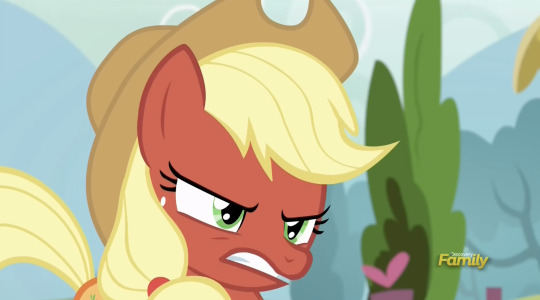
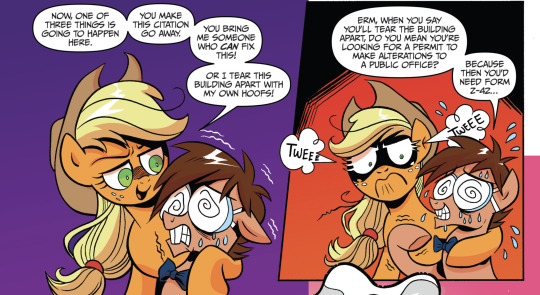
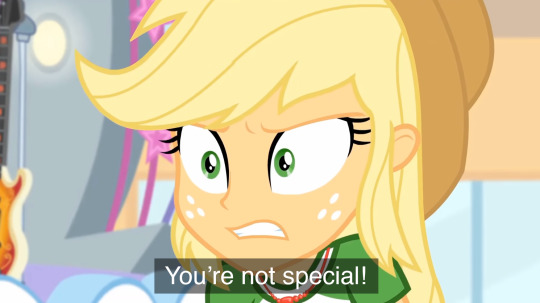
Subtextually, a lot of these flaws and anxieties can be (retroactively) linked to her parents' death, forcing her to grow up too quickly to become the adult/caregiver of the family (especially after her big brother becomes semiverbal). Notice how throughout the series, she's constantly acting as the "mom friend" of the group (despite everything, she manages to be the most emotionally mature of the bunch). Notice how AJ'll switch to a quieter, calmer tone when her friends are panicking and use soothing prompts and questions to talk them through their emotions/problems; something she'd definitely pick up while raising a child. Same with her stoicism and reluctance at crying or releasing emotions (something Pinkie explicitly points out). She also had a childhood relationship with Rara (which, if you were to give a queer reading, could easy be interpreted as her first 'aha' crush), who eventually left her life. (Interestingly enough, AJ also has an angry outburst with Rara for the same exact reasons as with EQG Rarity; jealous, upset that someone else is using and changing her). It's not hard to imagine an AJ with separation anxiety stemming from her mother and childhood friend/crush leaving. I'm also not above reading into AJ's relationship with her little sister (Y'all ever think about how AB never got to know her parents, even though she shares her father's colors and her mother's curly hair?).
AJ's stubbornness is a symptom of growing up too quickly as well. Who else to play with your baby sister when your brother goes nonverbal (not to discount Big Mac's role in raising AB)? Who else to wake up in the middle of the night to care for your crying baby sister when your grandma needs her rest? When you need to be 100% all the time for your family, you tend to become hard-stuck with a sense of moral superiority. You know what's best because you have to be your best because if you're aren't your best, then everything'll inevitably fall apart and it'll be your fault. And if you don't know what's best –– if you've been wrong the whole time –– that means you haven't been your best, which means you've failed the people who rely on you, which means you can't fulfill your role in the family/society, which makes you worthless . We've seen time and time again how this compulsive need to be right for the sake of others becomes self-destructive (Apple Family Reunion, Sound of Silence, all competitions against RD). We've seen in The Last Roundup how, when no longer at her best, AJ would rather remove herself from her community than confront them because she no longer feels of use to them.
But I guess it is kinda weird that AJ has "masculine" traits and isn't interested in men at all. It's totally justified that an aggressively straight, misogynistic male fandom would characterize her as a "boring background character." /s
At the time of writing this, it's 4:46AM.

#mlp#yeah i wrote this last night during insomnia.#yeah i know an embarrassing amount of crap about this kids show#but whatever it's my hyperfixation i'll store as much useless information as i want!!!#i'm gay and neurodivergent i have an excuse#in case you needed more proof that aj's my favorite character#personal#delete later#unless you like this analysis stuff#i get why they didn't reveal aj's parent's death until way later and why they didn't do much with it but i wish they did#cuz narratively there could've been so much material with aj's grief. like. i feel like we gloss over the fact that she lost her#mother and father as a teenager#i tried keeping my personal hcs out of this to keep it unbiased#but i'll put some in the tags#involving rarijack –– i think aj can be (but not always) very self-conscious about her relationship with rarity#anxieties that she's not the right fit or that rarity will move away and leave her some day or that another woman will take her attention#(like in rollercoaster of friendship?? nudge nudge??). basic seperation anxiety stuff#long post#regarding applebloom whenever i think about her and her parents i think about that scene in steven universe where steven looks up at#a portrait of his mother and openly wonders what kind of sack lunches she would've made for him. that episode still fucks me up
7K notes
·
View notes
Text

Kageyama's backstory only being revealed near the very end of the series is really interesting from a meta perspective.
For reference, his chapter is 387 out of 402. That's 96% of the way in.
To contrast, other characters like Tsukishima and Yamaguchi's backstories are shown in Chapters 87-88.
Now, we do get the explanation for his "King of the Court" title in Chapter 6, at the start of the series, but we don't see how he got to that point, or why he started playing volleyball in the first place like Tsukishima's and Yamaguchi's stories show.
It creates this situation where, despite being the deuteragonist, the character our protagonist, Hinata, is practically glued to the entire series, we barely know anything about him.
We don't even know he has a sister until that point whereas other characters' siblings like Natsu, Saeko, Akiteru, Alisa have all made appearances way before then. Even Oikawa's sister, though we don't see her, we at least know she exists because of Takeru.
He's both closed off to us (the audience) as well as the other characters in the series, and this results in them finding him rude or disliking his character in general (see: the "Kageyama is abusive" discourse that somehow keeps popping up even now).
Chapter 387 takes place in 2018 and was published in 2020 so it takes him 6 years of in-universe time and 8 years of irl time to really open up.
And the catalyst for all of this is Hinata fulfilling his promise of beating him.
You see, another thing to note is that, whenever Hinata thinks of Kageyama, he's always looking at him from behind.

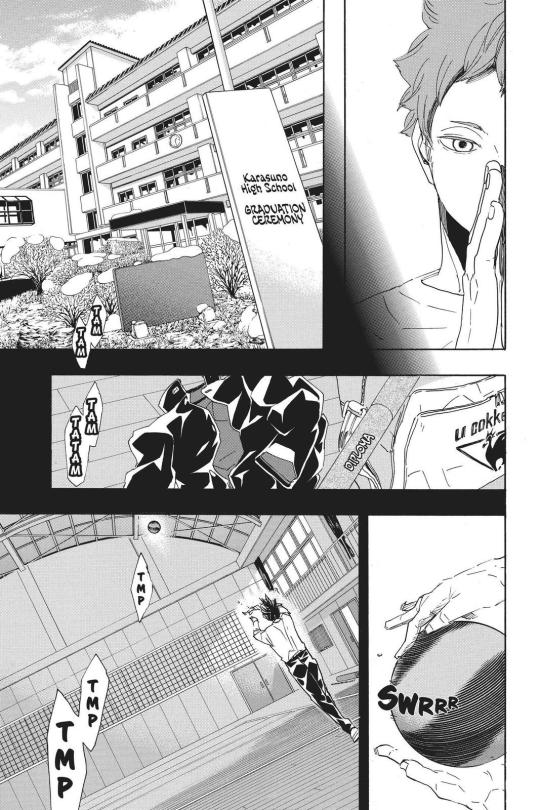
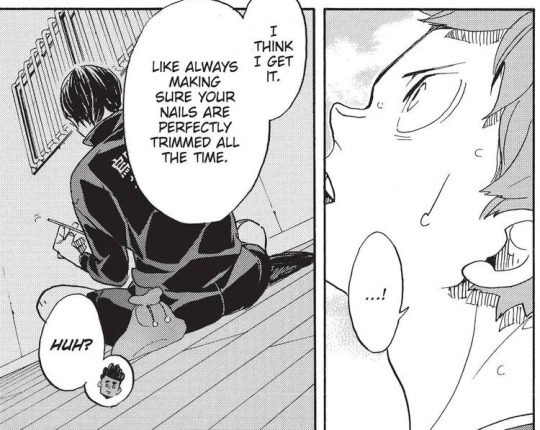
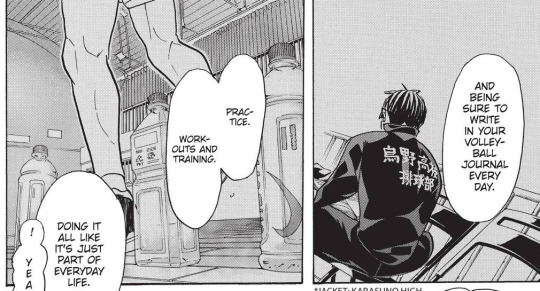
His internal image of him is someone who's always up ahead, someone he needs to catch up to, meaning Hinata can only see one side of him, he cannot see all of Kageyama until he catches up and passes him.
Which he finally does here.
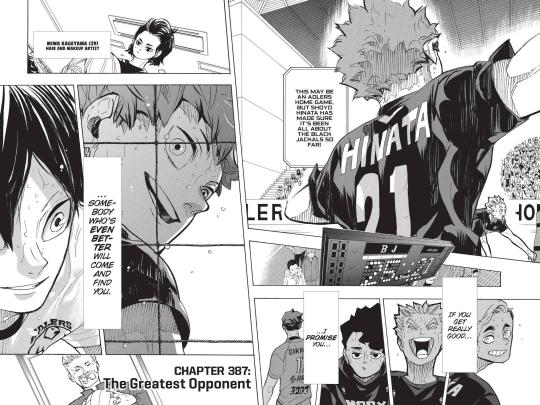
In this shot Hinata is finally the one who's looking back at Kageyama. At this moment, Hinata (and by extension the audience) can see him for all he is, can see how he was just a lonely boy who's been waiting for someone to meet him where he is, to keep running alongside him and not quit the race.







Someone he doesn't have to go easy on. Someone who would actually tell him to hurry up instead of slow down for a change.
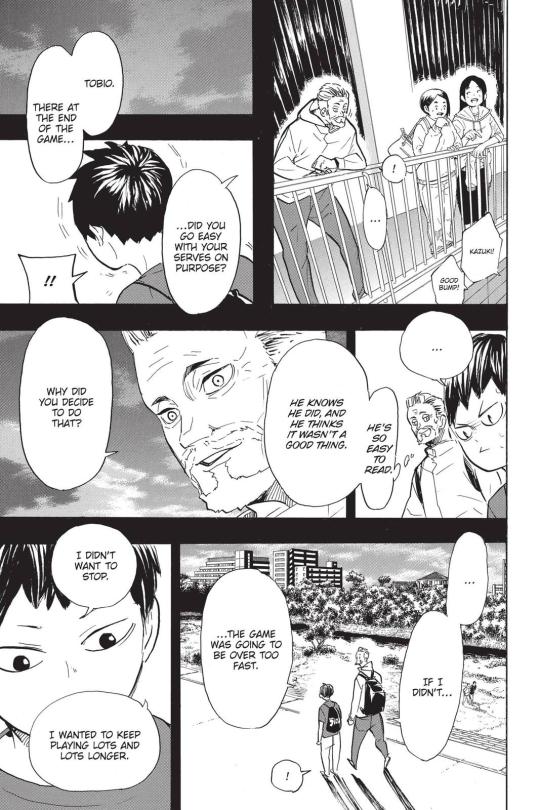
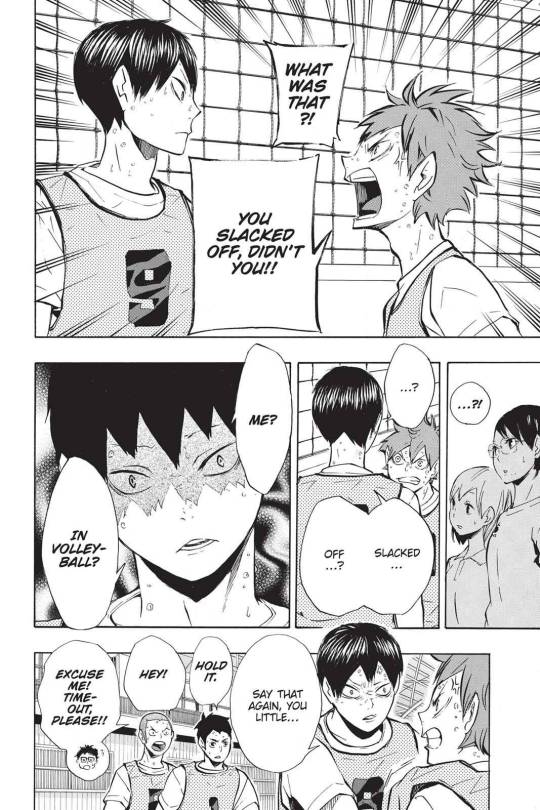
His someone better.


#toast post#haikyuu!!#kageyama tobio#character analysis#? it feels so pretentious of me to call this wall of yapping that 😭 but i feel i need a separate tag for these longer posts#i actually talked a bit about this on my twt and i think it sounded better there lol but i wanted to expand my thoughts a little#and also include more pics#hinata shouyou#kagehina
1K notes
·
View notes
Text
since edwin is very closed off, except for when he’s with his best friend, charles, costume designer kelli dunsmore reflected his buttoned-up mentality through his bespoke suit, complete with bowtie and collar. edwin’s outfit, along with charles’ period garb, were designed to help them stand out more in modern day port townsend. “i knew edwin would, because no one dresses like that now,” says dunsmore.
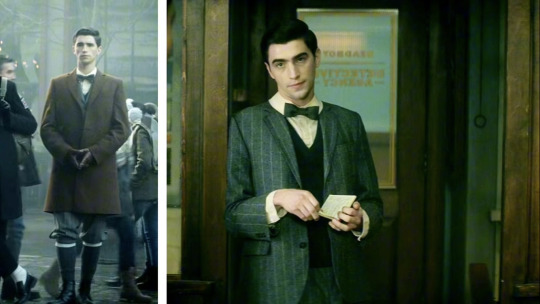
dunsmore wanted everything about charles to feel “a little bit cool and underground,” from his union jack and the who bull’s-eye patches to his checkerboard pins. his little cross earring and chain on the outside of his shirt are also meant to be homages to the ’80s.
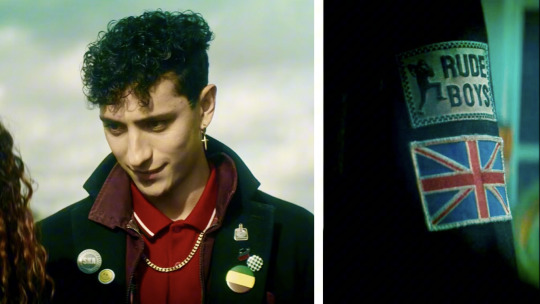
in the show, crystal’s hero color is purple, which you’ll notice in her velvet coat and long silk letterman jacket, which dunsmore thought of as a psychic cloak with hand-embroidered patches, including the wilting rose of england.
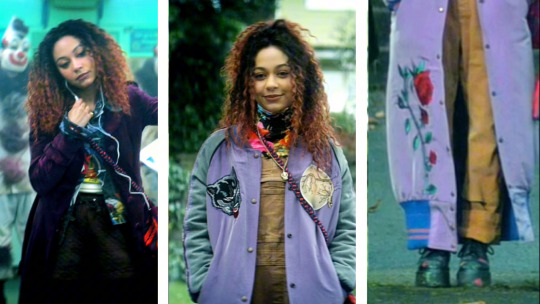
her brown trench coat represents an explosion of everything going on in her mind. dunsmore decided the scribbled words and drawings are a result of crystal writing all over it to express her inner turmoil. there are even lyrics on there from the song she’s listening to on the tube when she meets the dead boys.
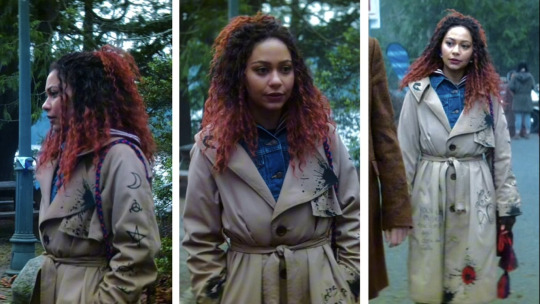
david’s connection with crystal seeps into her wardrobe, too. since david wears a flower shirt, dunsmore’s team hand-painted flowers onto crystal’s black boots. and niko is wearing a dark sweater with flowers on it when we first meet her, as an homage to crystal. the costume department also drew the same rune pattern the dead boys use to exorcise david in episode 1 onto crystal’s trench coat and on the tab of her wool bomber jacket. “so she’s always got some sort of protection,” says dunmore.
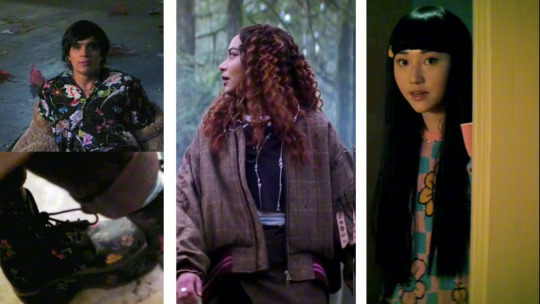
every color niko wears is inspired by what’s happening in that episode, from the green post-sprite exodus to blue when she’s feeling sad. niko only wears a white look, with nods to her japanese heritage, in the finale as a reset. the charms on her obi belt represent the colors she’s worn all season.
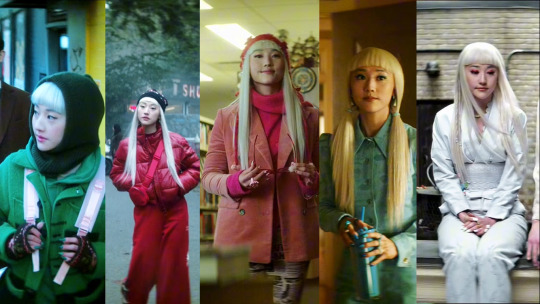
night nurse is someone who’s in control all the time and likes things to be in their proper place. dunsmore looked to vivienne westwood for inspiration, since everything in night nurse’s world is a bit exaggerated. (by the way, niko’s orange monochromatic look is a nod to her scenes with night nurse and night nurse’s red hair.)
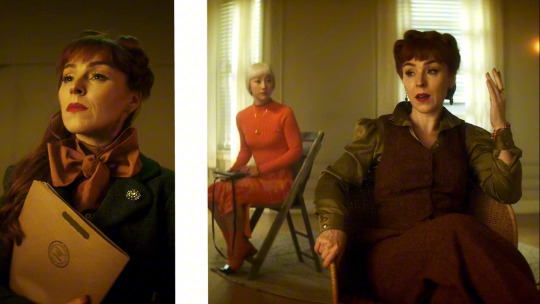
since david is a demon, he finds a london boy that looks cool enough for crystal to find attractive. that meant dunsmore dressing him in a shearling jacket you’d find in “all the guy ritchie movies,” black pants and creeper shoes. the costumer’s mood board for “david the d” featured radiohead and amy winehouse and her husband blake, who often wore hats similar to the one you see david wearing in the show.
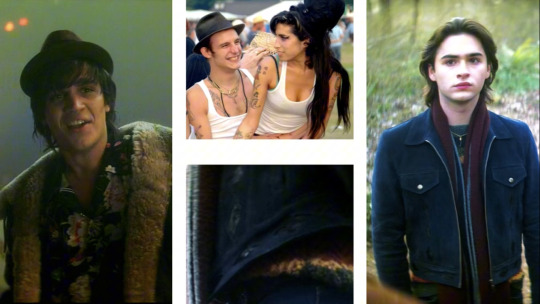
pay close attention to monty’s leather jacket and you just might spot an inlaid crow feather or two.
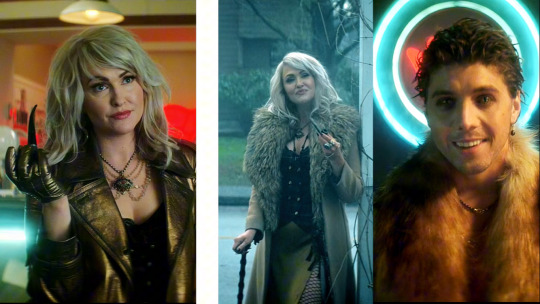
it’s not only esther who wears clothes with a gilt, old-gold color — cat king and night nurse also do as a nod to their villainy. (esther and cat king also have similar fur coats.) amidst her beauty, dunsmore wanted esther to be a little rough around the edges. she wears a cuff around her hand that’s adorned with a snake and a ring with teeth all around it to represent the teeth she’s collecting from all the little girls. her eye necklace is meant to be her witch pendant.
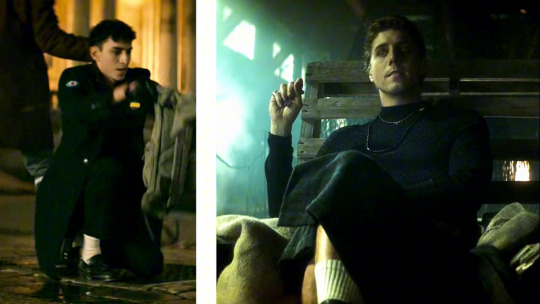
mischievous as ever, cat king has (cat) eyes everywhere and is aware of edwin’s affection for charles. so he wears charles’ socks the first time he meets edwin.
#well this is a very long post with an analysis of each character's costumes#charles rowland#dead boy detectives#edwin paine#edwin payne#niko sasaki#crystal palace#monty the crow#esther finch#night nurse#george rexstrew#jayden revri#payneland#painland
3K notes
·
View notes
Text
as much as I love the common "Tim worships/stalks Jason" trope in TimJay fanfiction because it's Good and making Tim a weird little freak is Fun, I think the underutilized dynamic is where Jason is the one weirdly obsessed with Tim and makes it Tim's problem.
Like, the moment Jason is confronted with the information that a third Robin exists, the first thing he does is cover his wall with pictures of Tim so he can just obsess and torture himself over it. That is the behavior of a man who is Unwell over Tim's existence and I love it.

red hood: lost days #4
And as much as a shitshow as The Titans Tower Incident™ is characterization-wise (though I think it has far more merit in depicting Jason's character than people give it credit for but I digress-) there's something very fun about the fact that even after kicking his ass, Jason respects Tim and is impressed by him.

teen titans (2003) #29
And on top of that, Jason can't seem to stop trying to ask Jason to Tim to work with him in some capacity.


robin (1993) #177



batman: battle for the cowl #2
While Battle for the Cowl is an exceptionally bad comic, especially for its characterization of Jason and the "be my Robin" bit is taken deeply out of context, I do think it's interesting how obsessed Jason is with believing that Tim is extremely competent, only held back by being "brainwashed by Bruce". (hence him leaving Tim for dead later on in the comic.) Jason seeing a darker side of Tim and wanting to bring that out of Tim, wanting to see what Tim could be if he let go of his loyalty to Bruce is so fun to me, tbh.
And in Robin #177, Jason seems genuinely upset Tim doesn't want to work with him. Jason sees such a raw potential in Tim and is obsessed with it, constantly wanting Tim to work for him and see Tim be the type of person Jason is. And despite Tim rejecting him, Jason doesn't shoot to kill Tim. I just cannot get over the fanfic potential of Jason obsessing over Tim, tracking him and seeing what he's capable of and what he could be capable of. Wanting to make Tim see things the way he does. To Tim it's corruption, to Jason it's freedom. Tim trying to 'save' Jason is fun and all, but Jason trying to corrupt Tim? That's even more fun to me. Watching that power struggle between them, Tim unable to get Jason off his heels as Jason gets more and more possessive and bold with each attempt.
And when Jason sees Tim successfully get Gotham back under control after a gang war, he's impressed. He praises Tim, even. And then Tim just. Breaks him out of prison.

robin (1993) #182
The way they're constantly trying to see something in the other that isn't there, hoping the other will come around? That is the most fucked up hate/love dynamic ever. Jason keeps coming back to Tim, keeps trying to find ways to get Tim onto his side. They're always chasing each other. And I think Jason would be the one to confess love first, the one to do anything to make Tim his. And when you consider after all of this, Tim has his Red Robin arc and is at his lowest, getting the closest he ever gets to considering murder? I think it'd be so fun to see Jason take advantage of that and worm his way back into Tim's life and finally push Tim over the edge.
#jaytim#timjay#tim drake x jason todd#jason todd x tim drake#batcest#necrotic festerings#for the record i could've continued showing examples if i delved into the new-52#but this is meant to be entirely a pre-flashpoint meta analysis of their dynamic#but in the new-52 jason explicitly says tim is the only member of the batfam he likes and they work together regularly#but new-52 also ate ass with tim's characterization so i cannot use it in good faith on this post.#my first tumblr meta on this blog and i'm feeling stressed about putting my thoughts in the open won't lie#one day i'll come back to the titans tower incident and expand on my thoughts on why it's not as bad as ppl make it out to be#dare i say. it's mostly in character for jason minus the ridiculous robin suit and some of his grandstanding#but that debate is for another day#fyi anyone can take this stuff as a prompt/inspo and run with it for fic pls go wild#someday i'll probably write my own take on it too
1K notes
·
View notes
Text
It’s been clear that the Tanizakis aren’t siblings from the very beginning
here’s some evidence now that it’s been confirmed canon…
everyone who’s read irl Tanizaki’s book knew that Junichiro & Naomi weren’t siblings as soon as they introduced themselves

BUT just because the Tanizakis aren’t siblings doesn’t mean you can’t feel uncomfortable about them. if you feel uncomfortable, GOOD. that’s exactly what they want
the Tanizakis, Mori— they all use these disturbing ruses to disarm or distract people in order to protect themselves, or to accomplish their goals. this is a writing device that asagiri commonly employs as a way to parallel the irl literature (it’s actually ingenious)
there are 4 main indicators that have always made it clear to me that Junichiro & Naomi are not siblings:
1. most obviously— their character designs. Harukawa is extremely intentional with character designs, & she very intentionally made Naomi & Junichiro look nothing alike
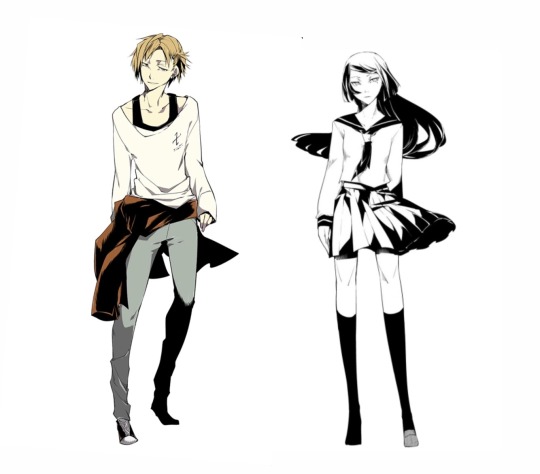
their eye shapes are purposely different
their color palettes are contrasting
even their differing styles of clothing have meaning
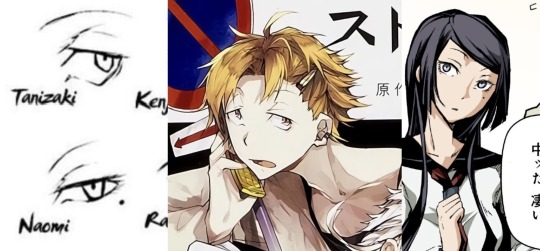
this was all done so that the audience could PLAINLY see that they’re not related— so that WE know that they’re lying when they say they ARE related
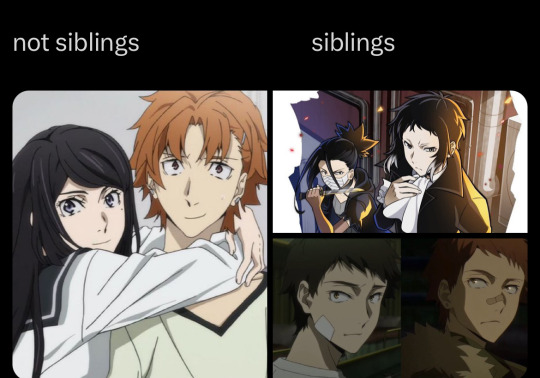
2. how the people around them respond to their act.
the general reaction is “don’t question it”— which is exactly what they want. “be distracted by how uncomfortable you feel so that you look away from what we’re hiding” (this is likely a protective measure)
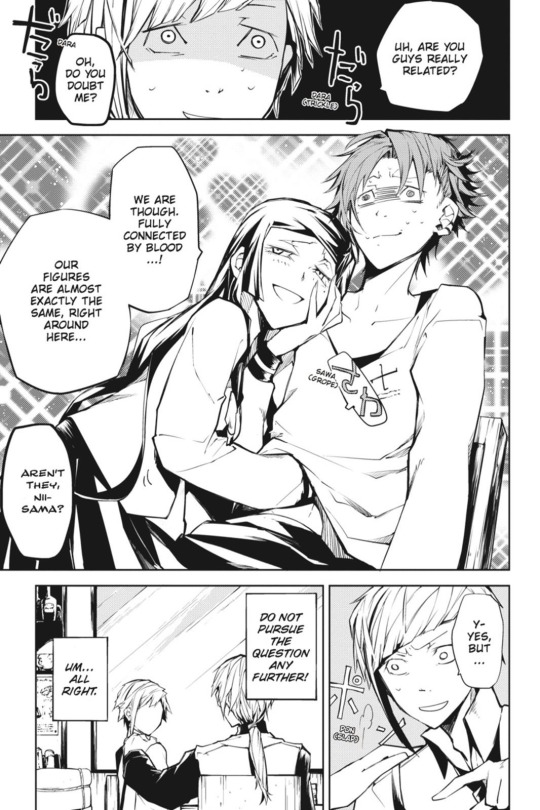
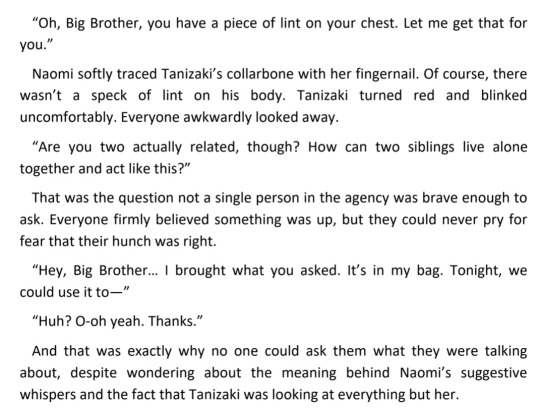
3. most importantly, this is meant to parallel irl Tanizaki’s book “Naomi,” where the main character Joji picks up Naomi to raise her into his ideal woman, but since she's so young (& a minor) they call each other cousins (Joji makes no sexual advances on young Naomi btw)
however, his plan backfires because when Naomi gets older & they get married, she flips the script on him & manipulates HIM so that he's under her thumb (which is why bsd Tanizaki is at a domineering Naomi's mercy). Joji let her have her way because of his masochistic tendencies
4. lastly is the emphasis that Asagiri and the Tanizakis themselves put on calling each other siblings.
over & over, it’s “my brother this” & “my sister that”
like they’re desperately trying to convince us that it’s true (“don’t let your lying eyes deceive you”)
here are just a few of many examples from the light novels…
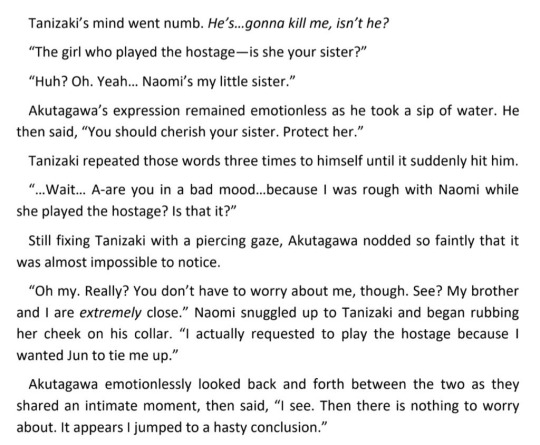

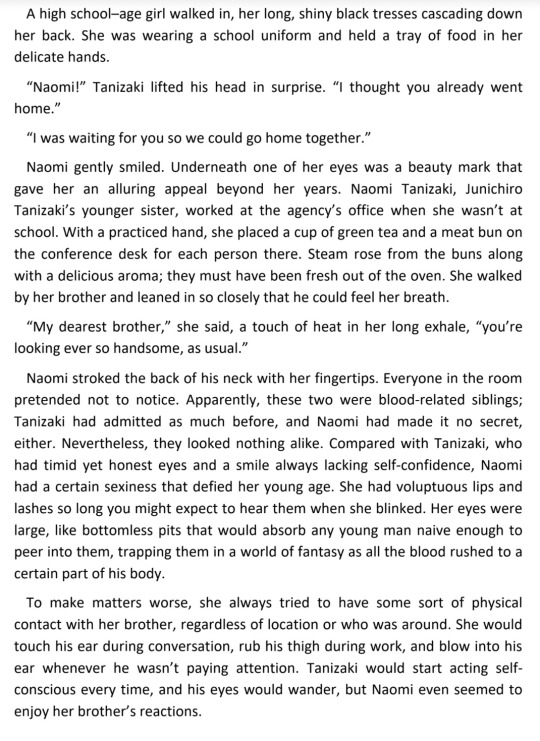
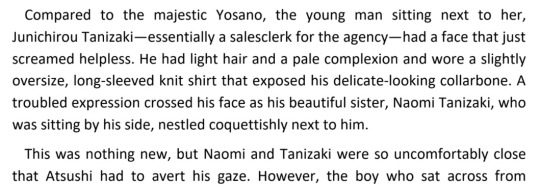
again, if you’ve read “Naomi” you knew that Junichiro & Naomi weren’t siblings as soon as they introduced themselves
just like if you’ve read irl Mori’s works, it’s clear that bsd Mori isn’t a pedophile
just like if you’ve read No Longer Human you know that Dazai’s an unreliable narrator. he makes you think he’s a bad person bc he believes he’s a bad person, but those around him see him differently (btw this doesn’t mean he’s never done anything “bad,” though bsd isn’t about morality— but that’s another discussion)
anyway, i’m so excited for the Tanizakis backstory to be revealed so that we can better understand why they use this defense!!
also let this be a reminder to READ THE LITERATURE if you’re able to!! even reading synopses & analyses of the coordinating books makes bsd make much more sense 🥹
reminder that this how you’re supposed to react while reading bsd:
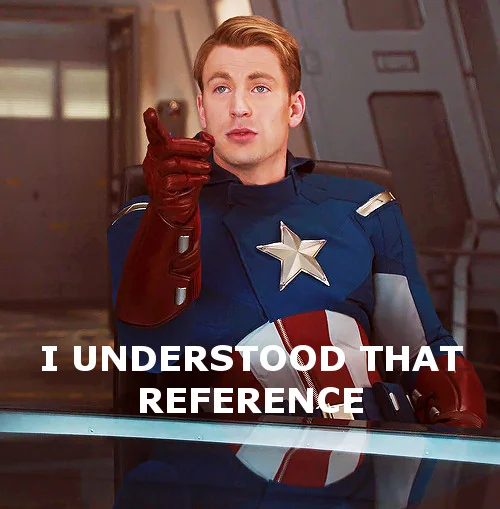
also, if you’re interested in a post explaining how Mori isn’t a pedo, i wrote this analysis on twt. OR you can read this document that one of my moots sent me (remember: analyzing a character does NOT mean you condone any actions they may or may not commit!)
#i hope this makes sense. i’ve had this in the drafts for months but was too scared to post it#i’m hoping now that it’s confirmed canon there won’t be as much backlash ^^’ pls be kind#darcy this is for you… i hope you like it :’)#also full disclosure i haven’t been able to read all of Naomi yet. mostly synopses & analyses. so don’t take my summary of the book as law#also hopefully now people won’t ignore the Tanizakis anymore!! not only are they so interesting. they’re also just fun characters#Naomi is so underrated & intelligent. i need more of her teaming up with Dazai#rambling about bsd again#bsd#bungou stray dogs#bsd meta#bsd analysis#bsd tanizaki#bsd naomi#naomi tanizaki#tanizaki junichirou#tanizaki siblings#bsd 118
913 notes
·
View notes
Text
Orange, Baby!
Rise Ramblings #316
When I think about Mikey, this scene always comes to mind.
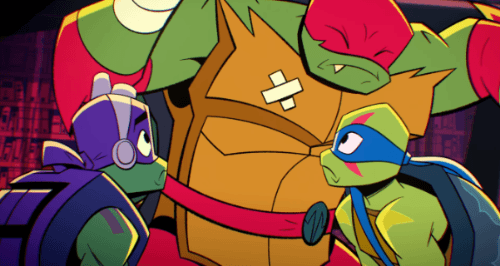
As soon as they step foot in the library to save Mayhem, Angelo instantly disqualifies himself…hilariously.
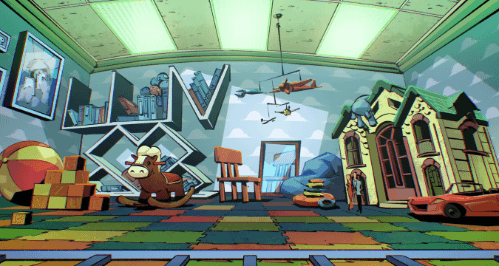
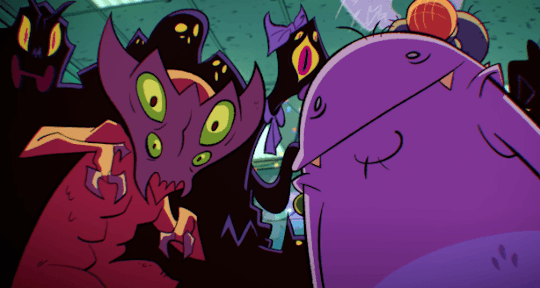
On first watch, I found it interesting that he made this decision with no hesitation, especially given the stakes.
At the time I just resigned to him being a silly silly boy, but now I know better.
Yet, before we get ahead of ourselves, let’s explore who Mikey is.
Michelangelo Hamato is the youngest turtle in the family, and it shows.




Consequently, he seems to possess a certain “youngest brother privilege" that his other brothers just can’t help but reinforce. This is the role that Mikey was born into. Therefore, he doesn’t have to push himself to be the smartest, or cleverest, or strongest turtle.

Instead, he decides to be the artist of the family. He’s a creative! He expresses himself everywhere, from stickers on his own shell, to tagging the lair, as well as on paper. The world is his canvas!
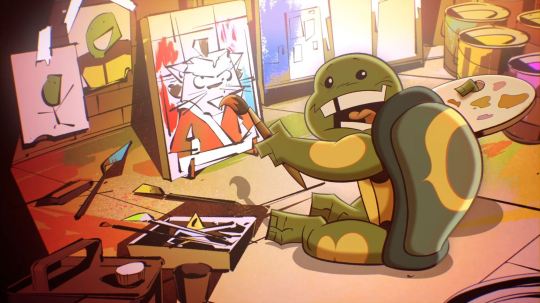
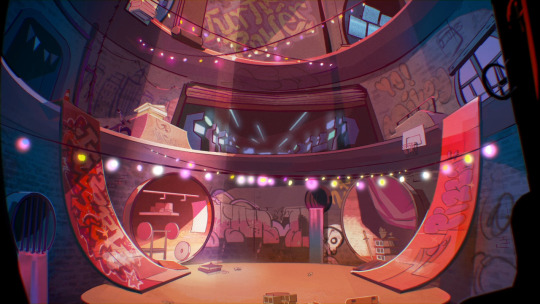
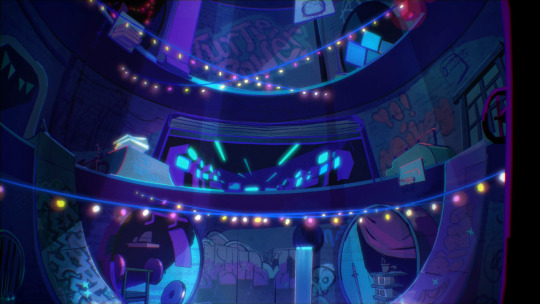
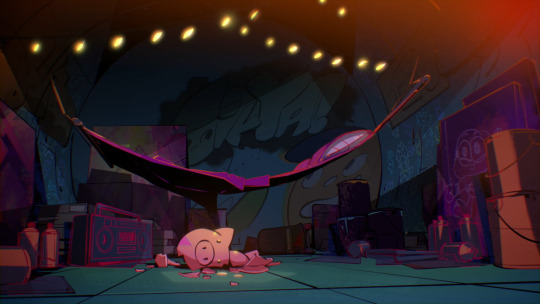
Michelangelo also expresses himself in virtually everything he does, so it’s easy to understand why he’s the most open, honest, caring, and emotionally expressive turtle of the bunch. To some it could be seen as a weakness, yet Mikey uses his emotional intelligence as a pillar of strength, of which he utilizes to uphold his brothers when they need support the most.
In the show, Michelangelo often takes on certain personas; Doctor Feelings and Doctor Delicate Touch. (For some reason, they are all doctors, but that’s beside the point.)
At first glance, the personas could be seen as silly bouts of make-believe. But I think that placing these roles upon himself for his brothers' sake is Michelangelo’s way of helping them cope with the world by offering them what they each individually lack.
For instance, Raph, Leo, and Donnie have trouble voicing their discomforts when someone does something they don’t like.
In other words, they have trouble putting their foot down.
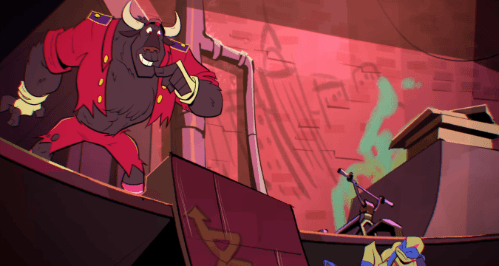
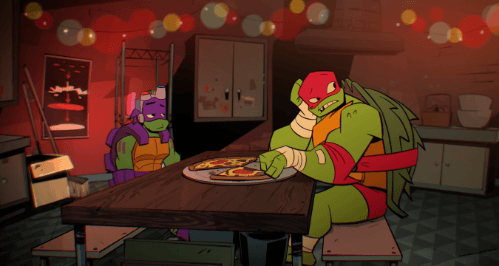
But here is Mikey to the rescue!
Dr. Delicate Touch has no such hang-ups.
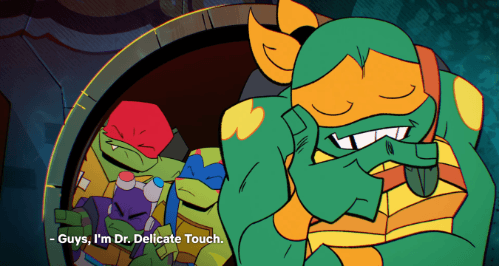
Similarly, when Donatello runs into trouble, as he is unable to recognize his own emotions, it’s up to Doctor Feelings to help his desperate client in need.
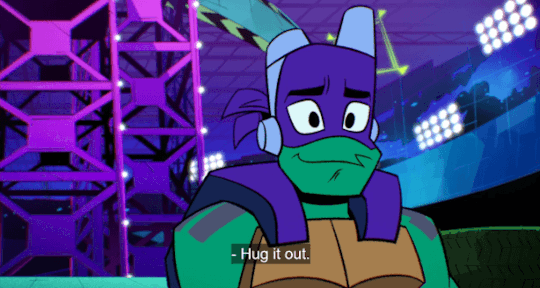
Through taking on these roles, Mikey is able to support his brothers and fill the emotional gaps in his teammates, which, inevitably makes them all stronger.
How is Mikey able to do this and how does he have the strength to take on these roles?
You could think that it’s just in his character, meaning, it’s just how he is. I don’t think so, though. He’s a free thinker, and a creative, but there’s something about these roles that is specifically catered to the needs of his family.
Then I realized, the only reason that Mikey is able to help his brothers in this way is because they first helped him.
Let me explain.
All four of the boys grew up in the same household. Although Splinter tried his very best (there is no Splinter hate here), a single depressed parent doth not a stable child make. Raphael struggled with the burden of his responsibilities as an ad hoc leader (see Being Big Red), Leo struggled with expressing his natural talents as a middle child (see Being Baby Blue), all while Donnie struggled with carving out his place on the team and his feelings of uselessness (see Being Purple Part One and Part Two).
Well, what does Mikey struggle with?
In my humble opinion, nothing.
The struggles of his brothers all related to each turtle coming to terms with themselves and coming to terms with their place on the team.
Yet, due to the love and support of his brothers and father, Michelangelo never had to ask himself if he belonged, struggle with his role on the team, or make huge life-changing decisions that could affect everyone.
Michelangelo is free to just be Michelangelo.
And as a free spirit who is completely in tune with his own emotions, he is able to do things like this:
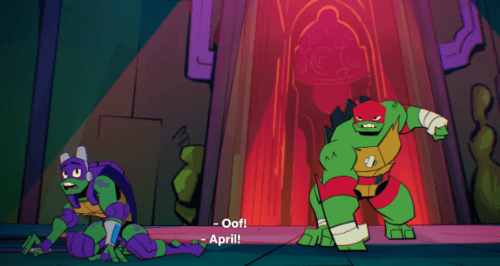
and this,
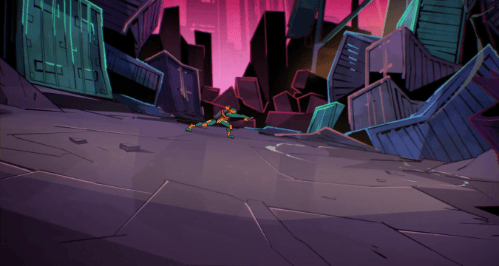
and this.
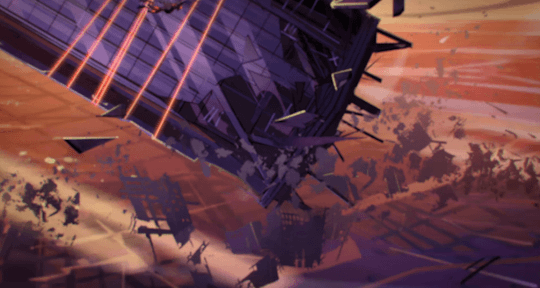
Let’s get back to the scene in the library.
Angelo sees the high stakes of his friend’s pet disappearing forever if they fail but makes the decision to disqualify himself anyway. Why? Because he knows that no matter what he does, it will all be ok.
He has complete faith in his brothers and their ability to solve the problem at hand, so he might as well have some fun.
This not the first time he’s come to this conclusion.
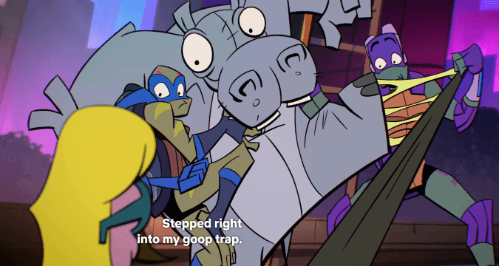
Through out this entire scene, Michelangelo plays in the background.
It’s scenes like this that makes me believe that Mikey’s faith in his family knows no bounds.
Altogether, his brothers and his father were everything he needed to become who he is. Reciprocally, he is free to be everything that they need him to be and more. Over…
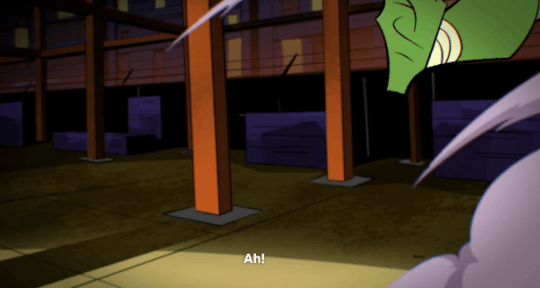
and over,
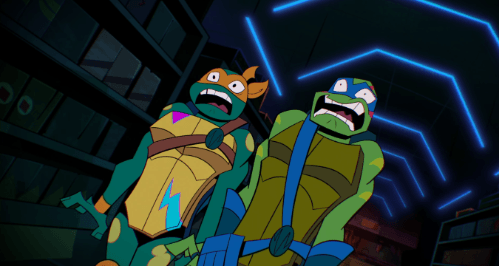
and over again
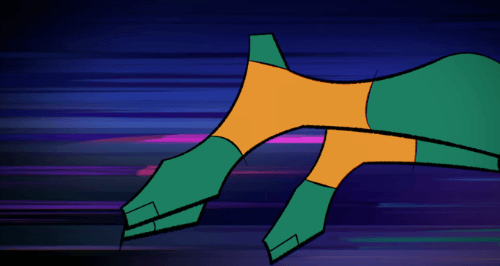
he trusts them completely.
And through this unwavering trust in his family, he is able to trust himself and his instincts. He knows that with everything they’ve poured into him, he can save them from, well, everything. Over…

and over…
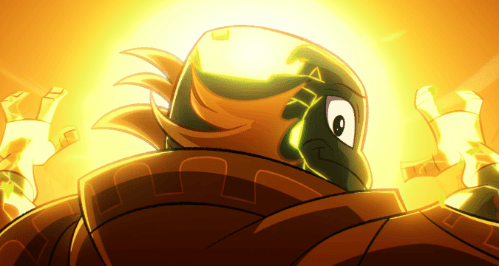
and over again.
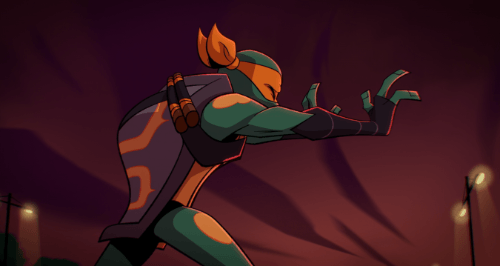
Hence, due to all of this evidence, I believe that through the collective love of his family, Michelangelo became the best version of the Hamato spirit, and thus, the best Mystic Warrior of all time.
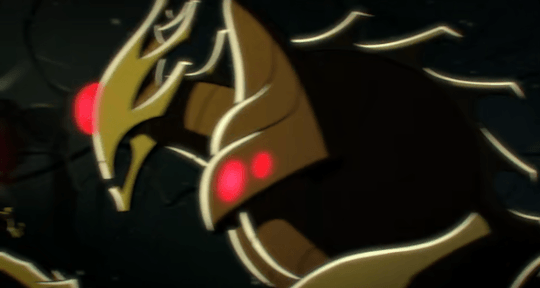
All because, he’s Orange, baby!
○○○○
Previous | Being Big Red • Being Baby Blue • Being Purple ○ Part One • Being Purple ○ Part Two
Finale | Being Hamato Yoshi
#phew!#this post has been a long time coming#thanks for sticking around!#🧡🧡🧡#starkiss ramblings#rise analysis#rottmnt analysis#character analysis#Michelangelo Ramblings#rise mikey#rise michelangelo#mikey#michelangelo#rottmnt michelangelo#michelangelo hamato#rottmnt#tmnt#teenage mutant ninja turtles#rise of the teenage mutant ninja turtles#rise of the tmnt#tmnt2018#tmnt 2k18#tmnt 2018#save rottmnt#unpause rottmnt#unpause rise of the tmnt#save rise of the tmnt#save rise of the teenage mutant ninja turtles
3K notes
·
View notes
Text
I've been rotating this scene in my head for a very long time and I think very few people talked about it not just in terms of “look Copia’s so cute here” but in the context of character analysis. Because right up to this point, Copia behaves like an arrogant bitch and demands attention and validation from Sister, while considering himself as her equal.
But AS SOON as she hints that Copia is not doing what he should be doing (isn’t thinking about the show), he turns into a closed child who is afraid of being scolded by his mother. He immediately closes in on himself (eyes down, nervously fixing his hair to look like a professional, voice much less imposing, he os almost whispering) and shamefully tries to justify himself and I think this says a lot about how traumatized he is and how afraid he actually is of his possibly imminent demise
#honestly this scene never leaves my mind#i think that it says SO MUCH about dynamic between them#the band ghost#ghost band#ghost movie#ghost rite here rite now#rite here rite now#character analysis#ghost papa emeritus#papa emeritus iv#ghost rhrn#cardinal copia#text post#ghost Copia analysis#sister imperator#ghost sister imperator
848 notes
·
View notes
Text
OK correct me if I'm wrong, but I feel like the main 'yin/yang' parallel with Atsushi and Akutagawa is not something like 'this one is bad but secretly has a good side and this one is good but secretly has a bad side'.
I feel like it's more about 'who they are at their core vs who they choose to be'.
At his core Akutagawa is kind and at his core Atsushi is not. But despite this Atsushi tries every day to make the kinder choices and I love him so much for it. He has to work so hard to be good.
He wants to be a bitch SO bad I know he does but he tries his best to help people and be nice (sometimes he fails but that's OK <3)
Atsushi doesn't always WANT to help people, a lot of the time he's selfish and scared, but he does help people anyway. He keeps helping people over and over again. There's still some selfish motivation to it, and his initial motivation for helping people was because the headmaster told him that's all he was worth, but overall he does care about the people he helps and it weighs on him if he fails to save them. And of course, as the series goes on he starts helping people more because he can rather than because he feels like he needs to.
In Akutagawa's case, he's still capable of being kind but his environment led him into being someone who chooses to hurt people. But he's always been a protector at heart. In the start he was bad compared to Atsushi because he was choosing to hurt people and keep the cycle of abuse going. Just like how Atsushi developed in why he saved people, Akutagawa starts to get redeemed when he chooses to not just act on his rage. Not only does he start to spare people, but he speaks more kindly to them (apologising to Higuchi and telling Kyouka he's proud of her). It all culminates into the moment he chooses to help Atsushi and sacrifice himself for him, going back to his core value of being a protector. Even when he's finally revived, he keeps this role in his new position as Aya's Knight.
I kind of see the streaks of white in Akutagawa and the streaks of black in Atsushi not as their 'hidden sides' but as their fundamental selfs. That's who they are at their core, and their main colours (black for Akutagawa and white for Atsushi) are how they're presented to everyone else and how they try to have people see them as.
#I'm just spitballing half of this but these are also my genuine thoughts on these two and their yin/yang parallels#I'll never get over Akutagawa being a protector at heart and getting that side of him buried with rage from growing up in the PM and-#-Dazai's old teachings#also Atsushi being selfish at his core is very important to me. He's not a typical 'kind hearted' shonen protagonist. He's kind not because#-that's how he’s always been but because that's how he chooses to be#I think that kind of character is even more admirable to me#it also fits well with Dazai being his mentor. Since Dazai also doesn't have that initial desire to save people just out of kindness.#He saves people as a promise to his dead friend that wanted him to live a good life#in fact that actually fits with Jouno too#now that I think about it quite a few bsd characters fit into that 'not kind because they were born that way but because they chose to be'-#-archetype#hell yeah. That's kinda cool I like that#bsd analysis#Akutagawa#atsushi#akutagawa ryuunosuke#atsushi nakajima#sskk#shin soukoku#<- Not a ship post but adding this tag since I consider that their duo name too#bsd#bungou stray dogs#bungobble my post
1K notes
·
View notes
Text
The long-awaited (by absolutely no one) Peter Pettigrew post is here! I mentioned it in my discussion of my James Potter Savior Complex post, and wanted to follow-up just in case anyone was genuinely curious about this rat of a human. Again, I’ll preface by saying this post isn’t meant to demean or criticize any other characterizations that other fans have — this is just how I took it.
I’m a political science major. A lot of the stuff I learn is determined by the environment where things occur, and the time in which they happen. I think this idea applies to characters as much as it does public policy and state formation, so it’s hard to say that any of the Marauders would act the same way they do in canon if they were in the modern era. Peter is the lone exception, because people like him exist in spades. They always have.
He’s fucked over from the start. He’s an overweight, unattractive, acne-ridden teen in the 70s who happens to be friends with three guys who are either a) conventionally attractive, capable, and perfect or b) terrifying enough to be given a wide berth by your average student. Moreover, you feel like an outsider because the other three — and I’m going under the assumption that these guys were in a shared dormitory — had already become friends, and added you as an afterthought. From the get-go, you’re on the outside looking in. It’s only rational that, over the years — and despite the fact that Lupin wanted you to be included — you internalize the idea that you’re a weirdo. That you’re strange and pitiable and that they only hang around you because they feel bad for you. And outside of James, I don’t think any of them did feel that way.
The truth is that they actually do try to include him, and quite often. I’m partial to the idea that the Marauders were like a group of frat dudes, who threw a lot of parties and did a lot of dumb shit all the time, alongside bullying and hexing other students who gave them flack for anything at all. Doesn’t make them good people, but they sure were great friends. And they didn’t actively shove Peter out of the group or try to, from what I can tell. James and Sirius respected Lupin’s wishes to integrate him, and he even participated in their favorite group activity: bullying Severus Snape.
But if you’ve already internalized the idea, it becomes an ego issue. He’s so self-absorbed because of how you were raised and seen from childhood that every little thing is a slight. He’s so caught up in what they “really” think of him that he misses the fact that they are actually being nice to him. In the only way frat boys can be, of course. I can assure you James has tried to hook Peter up with some girls before, or shared drinks or invited him to whatever kind of ragers wizards have. Maybe initially it was out of obligation, but now it’s choice. After all, he did become their Secret Keeper.
But this is the core issue of Peter Pettigrew. He thinks everyone is fake because he is fake. He’s a liar and a shrew who wants to be on top at the end of the day, and is willing to do what it takes to get it. He can stomach the feeling of being an outsider to the Marauders if everyone else in the school thinks he’s part of their year’s most infamous group. There’s clout in that, and fame. He’s the kind to exercise that reputation when he can, the kind who gets a rush from the success which is unique from the rush James or Sirius gets from their own harassment. James’ issue is his arrogance, but he’s not addicted to a power high. Peter is.
You don’t get to be a part of a group like the Marauders for that long unless they think you’re a good person. I think Peter, like everyone else, was a victim of circumstance. He was the only one who didn’t join the group based on who he was as a person. Rather, he got the only friends he’d ever had because of his connection to someone stronger and more popular than him.
See how this reflects in his future? He’s a rat through and through — all the Marauders represent the animals they could shift into.
And with him and Lupin… oh, it’s torturous. Peter gets James killed and Severus framed, and does nothing to Lupin (from what I can recall!). Lupin gets off scot-free. Peter probably thought he was being nice, finally paying Remus back for the kindness he received at Hogwarts, not getting him hunted down. For Lupin, this was hell. He was the only one left, and he believed Peter was dead for so long.
So terrible! But so very Peter Pettigrew, who sold out his friends the moment he saw a chance to latch onto someone else who was becoming the new power, the winning power. He’s a group thinker in the sense that he just follows the trends he’s surrounded by, too afraid to strike out on his own unless it can guarantee him a spot near the top.
#peter pettigrew#wormtail#remus lupin#moony#the marauders#marauders#post: character analysis#everyone and their mother has an ego problem in this universe#probably because jkr has them
10 notes
·
View notes
Text
i think the thing a lot of papyrus takes get wrong is that they forget that, among other things, papyrus is funny. in my experience writing papyrus, i often find the most funny line is the most in-character one. an unfunny papyrus doesn’t ever feel like an accurate papyrus to me. it’s more than part of the game, it’s part of his character. and disregarding that is what messes up a lot of otherwise good impressions of him.
#the same can be said for sans too#the biggest issue with the 2015 fandom interpretation (besides shipping him with a child) was that he was way too serious all the time.#sans actually made me crack up several times during the genocide route#i lost it at “cool mutant hand”#also regarding papyrus#even back when innocent naive papyrus was a thing he wasn’t funny#and this is honestly a big problem considering how deeply intertwined humor is with undertale’s narrative#looking at you chara “laughed it off” dreemurr#toriel “laughs as she dies” dreemurr#sans and papyrus “always smiling” undertale#that one smiling npc in snowdin yeah i didn’t forget about you#seriously gotta stop putting half the post in the tags again this is getting ridiculous#undertale#papyrus#sans#character analysis#not much of one but i think it’s worth the tag
930 notes
·
View notes
Text
I find the fact that the confrontation at the end of UTRH is often summarized as Jason asking Bruce to kill the Joker for him fascinating.
Because that's not what happened.
Jason holds a gun up to Joker's head, gives Bruce another, and tells him that if Bruce doesn't do something (shoot Jason), he will kill Joker.
Jason doesn't give the gun to Bruce so that he would shoot Joker. He isn't expecting Bruce to pull the trigger on the clown. He's asking Bruce to do nothing. To be inactive. Because that will still be a choice, and despite having done nothing, everybody clearly agrees that Bruce would still, at least in part, be responsible for Joker's death.
...And to me, this moment is a kind of- microcosm, of the rest of Jason's point. Because after being captured and carted off to Arkham, the villain will escape again, and will kill more people. The only way to truly prevent that from happening would be to kill them; Bruce refuses to do so, and I respect his right to choose such a thing for himself, but it is still a choice, and if we agree that Bruce's inaction during the confrontation would leave him at least partly responsible for the Joker's death, then we must also agree that his inaction in permanently preventing the Rogues from killing more people means he is also, partly, responsible for all of those deaths.
#my dc posting#batman#dc#bruce wayne#jason todd#joker#uhh is this like analysis or meta#anyway. to me this is the message that scene sends#if we say bruce doing nothing would mean he assisted in the murder of joker then bruce doing nothing about the villains means he is also#responsible for those deaths#ANYWAY yes b4 you come at me;;#bruce's belief in rehabilitation and that everyone can get better is central to his character#and i love it and no i dont actually think he should kill the rogues or whatever#but the question there is. Are you fine with the future victims your decisions will cause?#Are their lives worth the slim chance any of these people will get better?#batman says yes theyre worth it. red hood says no theyre not.#thats the fundamental moral difference there#its why jason challenges the batman status quo#which is why he cant be harnessed well after his initial return bc comics can never truly escape that status quo#anyway i sure am having some thoughts for someone not that smart so if you disagree please tell me!!! just be civil or ill just block you <#...anyway this is another thing BTAS succeeds in bc i always feel like yes these villains do deserve yet another chance#despite what theyve done. bruce's belief in them doesnt feel stupid and naive#its abt what you yourself can live with. bruce can live w the deaths of the ppl the criminals he doesnt get rid of kill#and jason can live with killing those criminals and preventing further victims
902 notes
·
View notes
Text
the way patrick zweig is so clearly a creature of desire; so fundamentally hungry. always devouring, uncaring of how desperate he might appear for it—taking a bite of the line judge's bagel sandwich before he even sits down; scarfing down his hotdog before grabbing a bite of art's, and then later treating their churros exactly the same way; picking the cigarette that tashi slapped out of his mouth up off the literal alleyway street so he can finish smoking it. acting on his hungers without asking permission first.
the way art donaldson is comfortable expressing desire without acting on it; content to yearn. mr. i-do-what-she-says-and-then-i-win obediently drinks his green juices, his electrolyte mixes; he lays his heart on the table for tashi, twice, and lets her decide when to take it; he tells her he wants to kiss her, but then lets her come to him to actually do it. a lapdog, just like patrick says: he'll turn his pleading eyes to you, desire writ across every line of him, but he is too well-bred to ever snap and just take.
....except, of course, with patrick; but even then, only when he can sublimate his desire for patrick into the appearance of desire for another woman. snapping at the churro when patrick calls him out over sowing doubt in his relationship with tashi is the obvious one, but also the fact that art is the one to come first in their mutual-masturbation experience when talking about kat zimmerman (how much of it was because of miss zimmerman and how much of it was art letting himself imagine patrick with her?). patrick, in the churro scene, describes it as seeing art "lit up about something," and while he's not wrong i think it's more specific than that. art feels deeply, keenly, but he guards the flames of his desire so carefully; banks them down and keeps the embers glowing for years. tashi is content to meet art halfway, to take the quiet longing invitations he extends. patrick is not. his desire, his hunger, is bigger than that. he wants to see sparks fly. how perfect, then, that he is the only one who can bring that out of art. he does exactly that with the racket-neck signal, and art (once he's over his shock) is once again lit up; ready to take the win, not to have it handed to him.
the way tashi duncan understands them both, perfectly, from their very first night in that hotel room that was so formative for all three of them. she kisses art first, because she already knows that if she kissed patrick first, art would take that as a rejection and retreat; put his desire away. she kisses art first because she knows patrick will not give up on his own desires that easily. she understands how to stoke art's desires and how to temper patrick's and teach him patience. and because of that, she gets them both: she doesn't have to choose.
#challengers#challengers meta#patrick zweig#art donaldson#tashi duncan#fan analysis#challengers analysis#my post#text post#v speaks#character analysis
935 notes
·
View notes
Text
I fucking love Jimmy Mouthwashing so fucking much, he is PEAK character writing and I have SO MUCH to say about him
He wants to fix everything but never does anything right, he wants to help everyone but is the most selfish bastard ever, he hates Curly so much but worships him, he knows he's an asshole, he knows what he does is horrible, he knows he should apologize to everyone and he should take responsibility, deep down he knows it, but his pride is so important to him that he will never ever act upon it, and it's destroying him from the inside
And the fact that we get to play as him, see his actions and bad decisions first hand, GOD THAT'S JUST SO GOOD, we don't play as downright villains in videogames enough, there's nothing redeemable about him and that's what makes his character so AMAZING
AND PLEASE PLEASE PLEASE HUMANITY, OPEN YOUR EYES AND REALISE HOW FUCKED UP CURLY IS ASWELL
He has ZERO boundaries with Jimmy and implicitly enables his behavior of "I can take whatever I want because I deserve it" and if it's not ENTIRELY HIS FAULT (edit: not entirely his fault because Jimmy is a manipulating piece of shit which def played a part in how Curly saw him), he definetly played a role in it AND he is also convinced that Jimmy would never cause harm because Curly is attached to the image he has of Jimmy, but that's not who he is, Jimmy is fucked up and Curly is so absolutely convinced that since he's his best friend he knows him better than anyone that the thought of Jimmy being the monster he is won't occur to him before it's too late
#So insane about this game chat#Yall dont get them like i do /j#text tag#text post#text#character analysis#mouthwashing game#mouthwashing#curly mouthwashing#jimmy mouthwashing
428 notes
·
View notes
Text
Ideology of Exceptionalism and Gravity Falls; meta and character analysis

I had a whole ago read a post by @icanlife that had a quote by Alex Hirsch on Ford's greatest flaw, and wanted to explore what the flaw is, which is the ideology of exceptionalism; in the exploration, I’ll touch on what it is and how it is used in abusive relationships and cults, as well as how it drives multiple Gravity Falls characters and consequently how it impacts relationships between these characters, and how the show ultimately refutes exceptionalism.
Quick note here; I am not in any way, shape or form a psychologist nor have any formal training in psychology; this is written from my own experiences with this ideology and my own forays into psychology and trauma-informed learning. It is also written with a loose understanding that is likely not broad enough to cover all references to cults, extremist groups and abusive relationships.
The Ideology of Exceptionalism
First of all, we have to get through a drier bit, which is… what is the ideology of exceptionalism and how does it arise? Might be fairly obvious, but it is the belief that you are, or belong to, a group of exceptional people, thus more important and worth more than anyone else; ie, those who don't qualify as 'exceptional'. It is often a subconsciously learned ideology. Now, what qualifies one as exceptional can be extremely varied; generally it revolves around something that provides some form of privilege. Thus, it might be, as the main exceptionalist idea in Gravity Falls, 'intelligence', or power, or it can be such things as attractiveness, quantity of money one has, species, nationality, or skin colour and ancestral heritage. The ideology of exceptionalism, being by nature hierarchical, devalues, and at its worst, openly and violently dehumanizes those who do not qualify as exceptional.
For why exceptionalism occurs is an extremely broad topic, but I've personally found that, for exceptionalism revolving around intelligence, it's a result of a poor sense of self-worth, and having one's self-worth tied to what makes one exceptional. Poor self-worth itself (again, broadly) is a result of childhood trauma from a lack of positive affirmation and unfulfillment of the emotional needs of the child. Meanwhile, self-worth becoming tied to the quality of exceptionalism generally is a result of when positive affirmation was pretty much solely provided around their 'exceptionalism', especially when provided derogatory commentary, or a blatant example of how they would be treated if they aren't 'exceptional'. As a result of the general lack of affirmation, self-worth then becomes often solely reliant on the qualities of exceptionalism, as that is the only way for the child (and later, adult) to get affirmation of their worth, as well as out of fear of being ‘not worth anything’ like the examples of ‘non-exceptional’ people they have been given.
This is especially likely to occur when the child is a social outcast; the adoption of the hierarchical ideology of exceptionalism, and the devaluation/dehumanization of others often occurs subconsciously as an avoidance/minimization tactic from pain. This is to say, the child, and later the adult (if healthy self-worth is not established) goes 'it doesn't matter what the non-exceptional people say or if they accept me since I matter more than them because of my exceptionality'. It can even be taken further, that being shunned is part of one's exceptionalism, and becomes part of the qualifier of being exceptional. For instance, 'they just can't understand because they aren't exceptional and that's just a part of being exceptional'. This idea also neatly tailors into the part of the concept of being better then others means you are separate from others; this can be taken that someone who is special, needs to be alone to be truly special.
Obviously, exceptionalism is not a healthy coping mechanism for poor self-worth, as often such people constantly feel the need to prove and show off their exceptionalism to gain that affirmation and avoid rejection, which is stressful. As well, it often negatively impacts their relationships with other people as a result of the arrogance of believing that they are better than most others, or even deliberate sabotage due to their arrogance. This occurs as they flatten the complexity of human experience to black-and-white hierarchical categories of exceptional/not-exceptional through constant judgement of those they meet, and often refuse to engage with people who don't belong to their 'exceptionality', or even people they simply don't like, even if they technically qualify. Generally, those that they do like or have close relationships with, often due to being similar, are automatically labelled as 'exceptional'. Those judged as ‘exceptional’ also become privy to the open judgements of ‘non-exceptional’ others, out of a subconscious belief by the exceptionalist that the other believes similarly; something that may strain their relationship if the other doesn’t ascribe to exceptionalism. This all culminates in the exceptionalist being blind or even adverse to the diversity of experiences, which makes it difficult to create relationships and community outside of echo chambers of their own beliefs (if they can even find this), and subsequently, these people are often isolated and have very few to no close relationships with people.
However, all humans require connections with other people, relationships where one can rely on others emotionally and physically if needed and feel accepted; they also require to feel like they are worth something, that their life has meaning. Lacking meaningful connections and having a crippled sense of self-worth, a deep yearning hole is left in these people. Exceptionalism, especially as it is a narrative constantly pushed by Western society as it validates hierarchies, is then employed as a (often subconscious) trauma response to assuage this yearning hole, with arrogance and denial. And depending on the circumstances, it can be a very strong and definitive trauma response for people.
This isolation and lack of self-worth is catnip to abusive relationships, including cults and extremist groups. These types of relationships often heavily rely on isolating their victims or pulling them into echo chambers of solely the abuser’s rhetoric, to redefine what is healthy through gaslighting; as the exceptionalists are already isolated, this makes them extremely susceptible. They also often provide these people affirmation, and in these cases especially about their exceptionalism, thus confirming their self-worth, their 'specialness', while also providing them the connection they have been lacking, either through the cult community or through the abuser’s own presence. These emotional needs, which haven’t been met in a long time, if ever, begin to be fulfilled; something that abusive relationships and cults hinge on, rather than any form of logic.
Ideology of Exceptionalism and Gravity Falls
The main characters within Gravity Falls which are heavily ascribed to exceptionalism would be both Ford and Bill; this characterization deeply impacts the story and their relationships with others (technically the Northwest are another case regarding wealth, but less directly impact the storyline and thus tangential; Gideon also is an example, but as a mirror of Bill). With each of these characters I’ll go into detail within their sections on the way they began to ascribe to exceptionalism, and how it plays out later in their relationships; I will first begin with Ford, then move to Bill. Then, to cap it off, I’ll go into the characterization of Stan and the way Gravity Falls refutes exceptionalism.
Ford and Exceptionalism
Firstly, the quote from Alex Hirsch that kicked this whole baby off, as mentioned previously;
“Ford sees Dipper as someone who’s special like himself. That’s Ford’s great flaw, his arrogance is he believes that there’s special people, and everyone else. That human attachments are actually weaknesses. And the song and dance that he’s giving Dipper right now, is the song and dance that he gave McGucket, back when they were younger… ‘You and me are different, we’re better than everyone else. We have a path that no one else can understand, and only us can do this.’ It’s a very seductive idea for Dipper… Dipper is a smart kid, but Ford’s projecting. Ford loves Dipper because he sees someone who’ll tell him ‘yes’ to everything. Who’ll never challenge him, who’ll do a really insane dangerous mission.”
Very blatantly Alex Hirsch calls Ford out on his arrogance in the belief that he is special, in his belief in the 'lone hero' complex, in his belief in exceptionalism. And really, it should be no surprise that Ford does so, considering the way he's depicted as a social outcast as a child (other than Stan), and the way his parents have been clearly shown to be not particularly emotionally supportive (“I’m not impressed”); they don't provide positive affirmation except for his intelligence (mostly due to the possibility of money making through it…), while also actively comparing him to Stan who is derogatorily ‘not-exceptional’, and ‘worth less’. This all sets Ford’s self-worth up to be fragile, and other than Stan who wholeheartedly accepts him, he is isolated and invalidated; plus, the only other validation he receives is around his intelligence. All very classically fitting the profile for exceptionalism.

Image id: Stand and Ford when they were children, both clearly enjoying each other's company.
Ford’s belief in his exceptionalism catalyzes after the shattering of his and Stan’s relationship. Previously the twins are shown to do everything together, having a very close caring relationship; something unlikely if Ford thought he was better than Stan. Also, when Ford is talked to about his opportunities, Ford looks uncomfortable at the way they talk about Stan as inferior, compared to how he himself is being praised; but in the offer he’s simultaneously finally being validated, he’s being told he’s someone worth something, and he’s going to be someone worth something after this. And then the science fair incident occurs, and Ford loses that validation from his parents, from the judges and a future of more validation; after being promised validation and acceptance, it slips through his fingers. And in his anger of being denied that, it becomes easy to begin to slip subconsciously into the rhetoric the others have been feeding him; that he’s exceptional, that Stan isn’t, and he deserved to be recognized for his worth. So he breaks the relationship with the only person who accepted and validated him for who he is. With that loss of previous support, Ford becomes then deeply obsessed with proving his exceptionalism to the world to assuage that fragile self-worth, to become accepted, or even better, revered, confirming that he is someone of worth, someone special, like he was promised.
Ford’s obsession also doubly functions as a way to alleviate his guilt over shattering their relationship; if he’s exceptional as he believes, then he’s within the right to respond the way he did, as he’s worth more than Stan, he's better off alone, and he has a right to be angry over being denied that validation. As well, in much the same way as it is used as a way to alleviate his guilt over the end of their relationship, it is also likely used in a way to minimize the pain of being ostracized (although not directly depicted); afterall, Ford’s keenly aware and insecure about his social ineptitude and his six fingers as things that make him different from other people, case in point with his experience visiting Lazy Susans Diner. Thus it wouldn’t be unsurprising if he uses the idea of being worth more than those who ostracize him to imply it ‘doesn’t matter’ what they think. His ostracization by nature keeps him from generally forming close relationships, with the exception of Fiddleford (who much like him, is socially outcast, and intelligent) during his university days. As a result, he's isolated and acutely lonely, having lost Stan.

Image id: One of the missing Journal 3 pages in TBOB, detailing Ford's botched social interaction in Lazy Susans Diner. In the background is the print of his six-fingered hand.
In his obsession over being acknowledged, Ford, like many others who believe in exceptionalism, identifies strongly with the causes of his ostracization (his intelligence, his six-fingeredness) as part of, or wholly, makes him exceptional. It is obvious through his choice of study; with the grant he has been gifted, he chooses to revolve his work around the weird, the outcast, something that you see Ford gravitate towards being an outcast and deemed 'weird' himself (which in Journal 3 he openly talks about). Something that can be, much like him, framed as 'exceptional'. His work is even recorded in a journal that Ford deliberately chooses to put his six-fingered hand on the cover of. Intertwined with the way it becomes adopted into the idea of exceptionalism, is the keen loneliness from his ostracization and a deep desire to be accepted and a wish to find a community of other weird people.

Image id: Two pages from journal 3, labelled 'Myself', in which Ford is open about being weird, and a social outcast, while also noting his ambitions and that 'Gravity Falls, [is] the place that I fit in.'
Ford and Bill
All of this culminates in Ford becoming an incredibly easy target to manipulate by Bill. He’s desperate to be acknowledged (and thus accepted) by an authority figure so that his belief in exceptionalism is justified and his self-worth confirmed. And he knows he’s intelligent, that he's exceptional because people have told him so, but he just needs to prove it with something that shakes the world. And the grant is finally his second chance after the fair, but he's stuck, and the research is going nowhere, and he's in a town where he doesn't really know anyone and he’s so terribly lonely. And sure, he clings to his exceptionalism but if he can't even prove it then is he really exceptional? Is he even worth anything like he thought he was? And what about what he's left behind, rejected, because of his exceptionalism?
And THEN he finds an incantation and he ignores the warnings because maybe, just maybe, this will be his break to get that acceptance/validation he has been chasing his whole life?
And then it's better than that.
A god, essentially, shows himself to him, an ultimate figure of authority. And he tells him that yes, he is special, he’s worth more than other people, and Bill’s only showing himself to Ford because he is so much more intelligent than anyone else. Ford is suddenly getting his exceptionalism confirmed by a god of ancient knowledge, an immensely intelligent interdimensional being, and he’s also showering him with affirmations, specifically affirmations around what Ford's fragile self-worth is based on. And even better, he's delighted by Ford's six-fingeredness; he's not put off at all, it even becomes his main nickname for Ford, just like it used to be for Stan all those years ago. On top of it all, Ford's own social ineptitude doesn't phase Bill, another thing Ford is self-conscious about; Bill's own social ineptitude as he's not human probably makes Ford feel comfortable, knowing that's not expected from him.
Through Bill, not only does Ford find someone who validates his self-worth through intelligence and even confirms to him that his weirdness is part and parcel of making him special, he also finds someone who he regularly (generally) is in contact with, who enjoys talking to him and even banters with him familiarly. Hell, Bill even deliberately goes out of his way (literally possessing a whole wack ton of rats, then dream karaoke) to celebrate his birthday with him; how long do you think Ford has simply skipped his birthday since he had no one to really celebrate it with? The loneliness, beneath his arrogance and belief in exceptionalism, is being fulfilled; for the first time since Ford was a teenager, he's fully accepted by someone, social awkwardness, six fingers, exceptionalism and all.

Image id: One of the lost pages from Journal 3 in TBOB, the 'one thing led to another' page, with Bill and Ford singing karaoke and drinking together, both clearly enjoying themselves; Bill has an arm slung around Ford's shoulders.
So it's really no surprise at all that Ford fell for this, hook line and sinker. Hell, if I was in Ford's shoes I would fall for it just as hard. And I've seen a few posts floating around talking about how Bill is bad at manipulating, and no, he's not. He was able to pinpoint exactly what Ford wanted and needed, and provided that, was charismatic enough to provide that. Again, manipulation isn't about logic. It really isn't; it's about the emotional core in people, what people lack and what you can give them to slowly reel them in to sing your dance and song. And people will ignore vast swaths of red flags when you're finally being accepted, when you're finally getting your emotional needs met at least in some way or form. It's better than not having them met at all, such as previously. So Ford worshipping Bill is really not a surprise, especially as Bill deliberately stoked it.
All of this is part of why you see Alex Hirsch call Ford's belief in his exceptionalism his greatest flaw; because it allowed him to be very easily manipulated by Bill, and by its nature kept Ford isolated from others, evident by his arrogance in assuming he knows best and refusing to see other people who aren't as 'intelligent/weird' as him as worth getting to know, listen too and even reach out to ask help from, it's him believing he has to be the lone hero as someone whose 'special'. It's something that blinds him to the danger of his work around the weirdness of gravity falls because he’s desperate to seek a place where he and his weirdness belong, and it's something that plays out in each and every relationship he has because it's something he clings to so deeply. It's what cost him his relationship with Stan, who previously accepted him completely, and, as he's disinclined to form new relationships and as Bill actively strokes his paranoia (Trust No One…), ultimately further increases the hold Bill has over him. It's only Fiddleford’s presence as he works with Ford that allows him some form of outside reference and reprieve from solely Bill’s influence, something that Bill resents deeply and is clearly jealous and angry about, even if Fiddleford is helping create the portal. And it's ultimately Fiddleford, once he was aware enough of what was happening, calls Ford out on it, seriously jeopardizing Bill's influence over Ford; but Ford is too invested in the portal, in chasing his own ambition and caught up in Bill’s manipulation to take him seriously, until the incident with the trial, and Ford beginning to hear other voices then Bill.
Ford’s Exceptionalism and Wider Relationships
Now back to how it plays out in all Ford's relationships; we've already gone over it with Bill's influence, because it made him extremely easy to manipulate, and with his disregard of Stan in favor of validation of his exceptionalism. But Ford, as pointed out by Alex Hirsch, also exerts the ideology's seductive rhetoric to both Fiddleford and Dipper (who look up to Ford) in a similar way that Bill does with him (although there is a difference of it being used intentionally and maliciously, compared to subconsciously and earnestly, even if it is problematic). Ford, with his black-and-white view of exceptionalism, sees both Fiddleford and Dipper as people who are like him; 'exceptional', and so he treats them as such, and uses this rhetoric to coerce them into helping him.
For Fiddleford, the lure is how he can change the world, how he can be finally acknowledged if he helps Ford with the portal. And it works well; he willingly chooses to leave his own work and his wife and young son, to work with Ford. Much like Ford, Fiddleford himself is also a social outcast and regularly presumed less smart than he is, and he’s got a chip on his shoulder to prove himself, to gain acknowledgement and recognition from the world at large. Although Fiddleford has a family which presumes he’s not entirely lonely like Ford is, he also clearly has deep feelings for Ford, some which are hinted to be more than just ‘friendly’ feelings; it is likely the combination of the lure of validation and spending time with Ford, a kindred spirit that accepts him and an old friend/crush, that causes him to agree (afterall, it was Ford who made Fiddleford feel accepted and choose to stay at Backupsmore). And Fiddleford’s not even considered a partner, but rather an assistant to Ford due to Ford's arrogance, and he still drops everything to go! It’s more about their relationship and connection rather than validation, but that doesn’t stop Ford from espousing exceptionalism. And this is a distinguishing difference, because although Fiddleford would like recognition, he’s not there solely because of it; he’s not a believer in exceptionalism nor arrogant about his skills, and so, unlike Ford who is blinded by his obsession, he’s much more aware of the dangers of the weirdness of Gravity Falls. Thus, he's actively calculating the risks involved, and when he realizes there could be potentially devastating consequences of the portal, he attempts to talk Ford out of it; this fails due to Ford’s own denial and obsession over the portal. In the end, it all goes terribly sideways, and Fiddleford ends up losing everything he had; his wife, his son, his friend, his memories and himself to the trauma he had experienced at the invitation of his friend with the lure of validation and company, due to the memory gun he had created himself.
As for Dipper, much like Ford, he also has issues with self-worth (many of the episodes deal with Dipper finding self-worth; ie, the manotaur episode), has a physical oddity (his birthmark) and by far the trait he relies on most for worth is his intelligence (for example, in one episode he rubs it into Mabel's face over and over again in beating her in games). He's also extremely desperate to be recognized by authority figures as someone intelligent, case in point when he summons the dead after being made fun of by the government agents to try and show them that the information he's gathered is important after Stan dismisses his knowledge. This desperation to be seen as someone of worth from Dipper, much like Ford, extends to the need to be a hero, something he even says at the end of the zombie episode; yet, due to Mabel, unlike Ford he's not a lone hero, and Mabel also half the time acts as the hero.

Image id: Zombies crawling out of a crack after Dipper summons them; Dipper and the two agents look on in horror.
It all culminates in Dipper hero-worshipping Ford when he returns; really, no different than Ford worshipping Bill. And Ford clearly finds it extremely flattering; Dipper's attention and amazement of him feeds his exceptionalism. Exactly how Ford responded to Bill, Dipper is willing to do anything for Ford, excited too, in an attempt to impress Ford and be validated and accepted. And for Ford, that's an extremely heady feeling, especially as someone who has been constantly alone the last 30 years, especially when he had one previously confirm his exceptionalism all those years ago and stopped, and now someone is once again affirming that idea. And Ford doesn't have to be alone again, because he's found a kindred spirit in Dipper as his assistant, someone ‘just’ like him, someone who is exceptional. Because he sees himself in Dipper, he begins to espouse exceptionalism unconsciously, by praising Dipper's own intellect and adventurous spirit, assuaging his feeling of self-worth, while also telling him he's more important or better than others because of it.
And it's seductive to Dipper, because he wants to hear those affirmations of his self-worth, especially as he hero-worships him, but Dipper isn't sold on it, because it means leaving Mabel behind, it means believing that he's worth more than Mabel (and also, Stan, and all his friends he’s made in Gravity Falls). It's ultimately because of his relationship with Mabel that he rejects the ideology; he's not isolated the way Ford was with Bill, and he's not willing to break that relationship for that acknowledgement, because his relationships matter more to him.
Bill and Exceptionalism
Now of course, that's only on the Pines; what about Bill?
While it's obvious that Bill uses exceptionalism as a main manipulative tactic, it's not just an ideology he sprouts emptily; it's also an ideology he believes in, just like Ford, although it's less based on intellectual exceptionalism, and more on power and 'weirdness'.
This most distinctly can be seen in Bill's denial about what happened to his home dimension; Bill's belief in his exceptionalism occurs as a pain avoidance tactic from killing his whole dimension. Bill was clearly a social outcast within his dimension due to being able to see 3d; he's not accepted, and not trusted, to the point that there is medical intervention to make him blind. That's a deeply traumatic experience that completely erases one sense of self-worth, where one’s sanity is called into question by your parents on something that is not harmful, that's beautiful and you just want to share with them. It's a deep and clear rejection of who Bill is, and his ability. As a result, out of a desperate bid to be understood and accepted, he ends up trying to show them the stars. And it ends up killing everyone.

Image id: Page of TBOB, on 'The Early Years' which notes that Bill was an oddity for seeing 3d, something that was illegal to speak about. Bill frames it as something that made him 'special' and better than all the others.
Traumatized, and originally rejected by the dimension, he instead weaves an excuse of exceptionalism; that it doesn't matter what he did to them because he's exceptional and he's worth more than all of them because he can see 3d, because he's powerful, so he shouldn't/'doesn't' feel any remorse about it. With such a traumatic result of trying to be accepted by people, he rejects the idea of trying to be accepted for who he really is; instead adopting a facade of a monster that he believes he is (and eventually, becomes).
Even if he clings to the delusion of exceptionalism, and shuns attempts to find true acceptance, he still wants it; and that's where his henchmaniacs fit in, as they're all, as Bill's noted when trying desperately to get Ford to join him, weird; each has something 'wrong' with them, which is why Bill accepted them as his lackeys (although it's not like we know the context around these). It's a surface-level acceptance however, one more predicated on fear than emotional acceptance. He's taken his 'weirdness', much like many do who believe in exceptionalism,as ‘part of what makes him exceptional'.
In the same way that Ford wants to show the world that he's smart and intelligent by building the portal, Bill does so by wreaking havoc and taking over existences as a way to show the world that he's powerful, that he's someone to be reckoned with, that he's not someone to be ignored because he's someone who's worth more than others. If you can't be loved and accepted, then being hated and feared is better than being ignored; acknowledgement at least approaches acceptance, it's validation of some sort of worth. It also functions as deliberate self-sabotage of his morals, by proving that he is the monster that killed his entire dimension; if that's what he is, then that's who he's going to be, because if he wasn’t, then he has to come face to face with his remorse over what he did to his dimension and his whole house of cards around his exceptionalism and not caring collapses. So instead he keeps feeding the delusions the denial, and lies and lies and lies and keeps lying to ignore all of it, to wrap himself in this shroud of exceptionalism and brutality as a way to function. And it somewhat works, because he's mostly deluded himself about it all, even if subconsciously he knows.
And of course, this display of Bill's exceptionalism is what brings Bill to earth, to Gravity Falls, and to manipulating humans. In meddling with earth and humanity, beyond Bill's goal of taking over earth and fleeing his own unravelling dimension, he also enjoys reaping the benefits of being worshiped by humans, who find him awe-inspiring. Their amazement of who he is, and Bill's own posturing and manipulation of people leads to Bill literally forming cults (ie ciphertology) or having apprentices that worship/find him (to varying degree) inspiring; all reinforcing his feelings of exceptionalism.
Of course, Ford numbers among these people; he praises Bill and worships him, as he's played like a fiddle by Bill, because his self-worth and belief in exceptionalism is fucked up in a way that perfectly resonates with Bill’s. Because it's the exact same types of issues around self-worth, around being an outcast, being weird and wrong physically, and yet at the same time gifted. And Ford clearly is incredibly lonely and yearning for acceptance, but so is Bill; since the beginning he's been trying to find someone who would accept him, even if he's given up on it. And for his song and dance to entice Ford in, he pretends he's not crushed dimensions for fun, that he's not a 'monster'; a version of him he buried after he had tried to show his parents the stars, one that he occasionally resurrects and puppets around for manipulation (all lies are better when they have a grain of truth). And this version of him is worshipped, but above all is accepted, is loved by Ford. The softer parts of Bill, even if they are still weird as fuck, the parts that were never far beneath the surface for all his deluding, become loved by Ford. Much as Ford becomes hooked on Bill’s praise, Bill also becomes hooked on Ford's genuine love and care. It becomes personal, unlike any previous ‘inspirations’ and Bill over time gets to the point that he feels accepted, safe enough with Ford to share about his dimension much more close to the truth then he did with any of his henchmaniacs. He becomes vulnerable with Ford, in response to Ford’s own vulnerability with him. He’s finding acceptance for the first time in his life around the softer parts of himself, not just the feared acknowledgement that comes from his dimensions conquering; much like Ford is finally finding companionship and acceptance with Bill, not just only intellectual validation. Bill's also for once, not just self-serving; he cares, and goes out of his way to take time with Ford, even celebrating Ford's birthday (in the unique way he does things), both with the rats and the karaoke.

Image id: One of the lost Journal 3 pages in TBOB. Ford recounts Bill talking about the destruction of his dimension, and calls himself by implication a monster.
They're both fulfilling each other's emotional needs, needs which both of them have struggled with most, if not all of their lives (although their relationship is certainly not healthy, considering it's codependent as fuck, riddled with exceptionalism and oodles of power imbalance issues). And suddenly, against Bill's plans, Ford's no longer just a disposable pawn, but someone Bill wants as part of his team, someone by his side, closer than his henchmaniacs are. He's unwittingly fallen for Ford, and so when everything goes sideways in his plan, and Ford swears it off, suddenly cutting off their relationship and that acceptance Bill had finally felt, he spirals into grief and anger from the rejection. As a result, he becomes extremely abusive to Ford in desperate attempts to continue their relationship, and ultimately he becomes obsessive over Ford joining him again as Ford continues to refuse, as evidenced by both Weirdmageddon and the Book of Bill.
Stanley Pines, and the Refuting of Exceptionalism
Exceptionalism, being a negative driving factor behind many core character dynamics, is ultimately refuted by the show. This occurs multiple times over the show, such as with Mabel in the Pioneer Day episode, especially compared to Pacifica, but mostly through Stan's characterization. Stan is someone who has been since the beginning characterized (if lovingly so) as someone who is a failure by societal standards; he’s an older man running a run-down tacky tourist shop to swindle gullible tourists out of their money, has multiple divorces, has an ongoing feud with a literal 12 year old, clearly has had multiple mishaps with the law (some ongoing), is generally pretty self-serving and is extremely lonely and really had no close relationships until Mabel and Dipper showed up. He's not exceptional; he's not even what we would consider 'decent' enough to have a 'typical, hard working job’. In short, he’s a failure, a stark difference to the idea of 'exceptionalism' that characterizes Ford. If he's gifted in any area, it would be charisma (debatedly), not anything else.
But it's still Stan who rebuilds the portal from literally only one journal (not all three!) and gets it to work. It even seems like he only needs some codes from the other two journals when he does get them, suggesting that he was able to extrapolate from what was left and the first journal’s blueprints to fix it entirely, something that is extremely difficult and technically complicated (Ford, Bill and Fiddleford all worked on it together!). Stan's able to do it, even if it's been shown he's not 'naturally' gifted in that area. And it's something he does as a result of his deep care for Ford; because even after their fights, he cares about Ford and wants to right his wrongs, believes he should, because of his whole life of being defined as a failure and even worse than that, screwing up his ‘exceptional’ brother’s life. And he’ll do it even if that means learning how to build an interdimensional portal, even if it takes up thirty years of his life doing so, and he doesn't waver. Much of this is connected to his own complexes around being deemed a failure compared to Ford, having failed to succeed in his life, and how he feels that he needs to atone for screwing up Ford’s life, now for the second time; but beneath it all, he also cares. Much like Ford, he's extremely lonely, but he's not blinded by Ford's arrogance, and as a result he wants to make sure Ford's safe, because that's what he used to do, they’re twins, they grew up together, they once they had fully accepted and cared for each other, and dammit that still means something, and Stan hasn't found that depth of emotional connection since. So if possible, he wants to rekindle that closeness they had, but first, he needs to bring Ford back.
And in the end, it's not Ford's own special gun he built using his intelligence that 'kills' Bill. It's Stan, someone who Ford had long ago broke it off with in search of validation of his exceptionalism, someone who both Ford and Bill labelled as 'not-exceptional', who defeats Bill. It's exceptionalism's devaluation of people who are 'not-exceptional' that causes Bill to underestimate the Pines beyond Ford, and it's only when Ford put aside his exceptionalism and his refusal to accept and trust 'non-exceptional' people, that is, trust Stan once more, that causes Bill to end up defeated by Stan.
In the end, it's not about who's 'smarter'; it's a reminder that everyone has different skills and are better at different things, but that doesn't diminish one's worth or value, and that just because someone isn't naturally 'gifted' in an area doesn't mean they can't learn or use different ways to get around obstacles. Ultimately, it comes down to that no one is worth more or less than other people; exceptionalism is a lie. It’s a lie and an excuse, and it's certainly not a healthy way to assuage one's poor self-worth. What does matter is creating positive healthy connections with other people, and caring about them. This creates a community where you can be yourself and be emotionally fulfilled through these connections; and when opposition does arise, you become able to fight it together, and fight so much stronger than if you are alone.
And by the end of the show, you see that. Ford begins to let go of the ideal of exceptionalism and its black-and-white categorization; finally recognizes his own faults around prioritizing validation of his intelligence and exceptionalism over his relationships, and finally, after all the years, chooses to create and rekindle positive relationships with people, trust people, and make amends. And in the end, he goes sailing with Stan, prioritizing their relationship, finally fulfilling their childhood promise.

Image id: One of the pages written by Ford into TBOB. Ford refutes Bill's idea of happiness, and says he has finally found his own happiness, and it looks like the photo taped in, of Stan, Ford, Dipper, Mabel, Soos and Wendy, all smiling together.
TLDR: Exceptionalism, an ideology of categorizing people into being special and worth more vs plebian and worth less, is a trauma response and subconscious ideology that characterizes Ford and Bill’s lives, deeply impacting all their relationships as it is used to coerce people into doing what they want, makes Ford easily manipulated, and breaks relationships through their arrogance. It is ultimately denounced through the way Dipper chooses to reject Ford’s offer and his rhetoric of being exceptional, and through the way it's not Ford’s intelligence, but rather Stan, who has been labeled as 'not-exceptional' and a failure at life, that defeats Bill through trickery. It's a reminder that everyone has worth, and no one is worth more than other people, even if one may be gifted in certain areas; the ideology of exceptionalism is fragile and a lie. In the end, creating a caring, loving community around oneself is where strength truly lies, as is seen with the deep care and love the characters have for each other, and the repairing of Ford and Stans relationship.
Thanks to the lovely @eshtaresht who deigned to beta read this monster of a post for me
If you enjoyed this meta, (first of all if you read all this you're a champ!) I've also done another gf meta post! (It's shorter I swear)
#gravity falls#ford pines#stanford pines#bill cipher#stanley pines#stan pines#hugin rambles#hugin rambles gf#journal 3#the book of bill#thisisnotawebsitedotcom#billford#fordsquared#gravity falls analysis#gravity falls meta#book of bill#tbob#christ its so long whyyyy#also oh nooo i wanna do another thing but SPECIFICALLY on trust. gravity falls is ultimately about strength in community and hnnnghhhhh#that makes me wanna cry#also i had so many thoughts. also on the denial part of exceptionalism??? oh baby Bill fucking LISTS it in his book#like sir. please#anyways i love media analysis and im totally normal about all these characters#also like Fiddleford is. like. yikes man.#anyways uhm. does dropping a 6k essay post make me sexy? please say yes (i HIGHLY doubt it#sheesh who's got time to read all this... psssspsspspp theres PHOTOS that TOTALLY dont have more reading in rhem nawwww#i totally dont know what ur talking about mhmmm#if youre like is this about gifted kids- yes. yeah. i just didnt name it. its also about wider things but. yeah#also. unofficial title? Gravity Falls and Gifted Kid Issues an analysis#oh boy sure hope my post about gifted kid issues is a hit on the gifted kid issues site
621 notes
·
View notes